#it’s not connected to the show but it’s sherlock related so obviously i’m interested
Explore tagged Tumblr posts
Text
does anyone else avoid something that yk will cause you a painful autism moment
#there’s a sherlock podcast that like#it’s not connected to the show but it’s sherlock related so obviously i’m interested#and sherlock twt is obsessed with it#but liek i physically cannot sit down and listen to it#ik it’s gonna cause my brain to explode and i actually don’t like being obsessed with things#bc it’s always so intense it’s too much#and that kind of intense emotion has only ever happened for sherlock and more recently portal#and fantastic mr fox#but yk i can handle that one now for the most part#portal to its manageable as long as i don’t think abt them too much#but sherlock? it’s actually so intense i had to stop my rewatch bc i could feel it coming back and it’s actually really painful#i miss them a lot and i have too much love for them that the only way i can consume the content#is through fan art and just thinking abt what i already know abt it
1 note
·
View note
Text
So, I did a little sarcastic-y review from the salt mines for RNM 3x09. Warnings for excessive sodium content, Maribel mourning, a desire to recycle cardboard, and, of course, Malex opinions. Without further ado:
- Every time Michael smiles I forget for like 5 whole seconds how much I hate that Malex keeps me shackled to this show. Too cute that he brought Alex lunch (and probably hoped he could sneak a glimpse of him) and they're going on their first date (omg omg omg).❤❤❤❤❤
- Kyle should yell at people more. Starting with his garbage friends who left him in a barn without proper triage or jello cups while he was in a coma (why didn't they just keep him at DS if he's having appointments there anyway? Nevermind... ). Alas, he's starting his understandable rage tour with Uncle Edgelord, who, naturally, makes a dramatic statement and tries to leave. I am so glad Kyle called him on that.
- Delmanes would be cute if Greg didn't have the personality of cardboard. They've created a character who is actually only here to remind us of how special and amazing Maria is. Turns out that's not super interesting. And it's so painfully obvious that it's a pair-your-spares situation. I really wish they'd just give her Kyle, he has the patience of a saint. Anyway, Isobel's pigtails are cute af (rip my Isobel/Maria/Kyle heart - I would have taken Isobel interrupting Delmanes and Heather's post with pigtails today as signs if not for genetics).
- Anatsa and Isobel's development seems to have taken place completely off-screen, like everything else gay on this show, so I'm guessing it's gonna stick. Honestly...I guess this is controversial but Isobel and Maria have really good chemistry and a history. I know their bond is supposed to read "sibling" but it doesn't for me. And rather than waste time watching them flirt with these one-note (ah, Greg chimes in right on time with a convenient line any rando could have delivered) LIs, I'd much rather see them get closer. The whole related thing has thrown a wrench into it for me. That said, it's nice to watch a woman be encouraged to go after another woman. 🎉
- Alex the sci-fi/fantasy nerd figuring out immediately that the hallucination is his own subconscious is 100% legit. Much like Kyle not letting his uncle pull a classic tall-dark-and-broody exit, I appreciate Alex's 4th-wall break moment.
- Not Max and Liz proving that discussions about s2 drama can occur on Roswell New Mexico?! What? Must be a straight thing. Lucky them.
- Isobel is actually acting a lot like Sherlock Holmes when he's on a case, from the wardrobe to the focus, and it's hot. Also, totally believable that Isobel would be able to pull up that pod from under the ice because we know she's been training even if it didn't happen onscreen. Because she told us. Just a suggestion.
- I love the idea of Jim Valenti as a double-agent, but I don't see how Eduardo thought he could keep Kyle safe by never knowing him. It feels like there's a lot more here Eduardo isn't saying.
- It wasn't a sister-fight that Maria and Isobel had, but whatever (no one got physically shoved or brought up a horrifying memory from 100000 years ago to shove in someone's face in public - doesn't count).
- Also, why would you waste a glass by throwing it into the fireplace? Wouldn't it just explode back in your face? Man, the show is trying so hard with Maria and Greg, I want to give them some kind of romance-novel award for effort (but not success).
- Not Liz and Max showing us that it's possible to move forward by discussing your past mistakes like adults instead of pretending they didn't happen!? What? Must be a straight thing. Lucky them.
- Draw a line on the bottle? No way, Valenti, he obviously wants you to chuck that whole thing straight into the fire in a fit of passion to prove that his words had an emotional impact.
- Also, Kyle wins the prize for this episode for that speech to Uncle Edgelord. Everyone go home. When do I get a Kyle and Alex spin-off where they travel the world, defying sci-fi tropes and seducing beautiful men and women?
- Not Liz and Max talking loudly about aliens while breaking and entering! This one is actually very believable, I take it back.
- It was idiotic of Liz to trust Heath. And Echo keep having this same fight because MAX IS RIGHT BUT THE SHOW WON'T LET HIM BE. Which is so obnoxious. I would forgive Liz for almost any sin (like, idk, getting a better romantic storyline because she's straight) because she's gorgeous and smart and tough and I wanna go live with her and her mad scientist energy on a deserted island somewhere. But she's being real dumb rn.
- I love the t-shirt and if Vlambase doesn't sell one I will. But he couldn't have held up a radio and blasted some Barry White? I feel like that would have cleared everyone but Alex put of the building real fast. Also, what is time on Roswell NM? Was Alex just setting the alarm every so often for kicks? Does Eduardo really not check in on staff who are working with dangerous technology for days on end? Also, why is this entire plot happening over a single goddamn episode instead of two or more so that we can really feel Alex wasting away under the machine's influence? The reason this twist is at all surprising is also the entire plot's undoing - Alex's demeanor wasn't exactly one of a man obsessed (or an addict, tbh) in his last scene.
- Anyway, back to Rizzoli and Isles. I definitely am always super excited to hear the details of my sister's sex life. All the time. That is totally a sister thing except where it's really not. Do any of these writers actually have a sister? I feel like they must because the Michael/Max/Isobel sibling chemistry is always bang on but Maribel is just...flirty lady city. Oh, and look, the beard just showed up with coffee to cockblock - it really is R&I!
- Back to Alex's plot line, which, much like Isobel's coffee, is Express To-Go. He's become haggard and worn in the time it's taken Michael's mom to find a cute sweater in the void. Seriously, we wasted like 3 whole episodes where Alex was presumably sitting in DS twiddling his thumbs and now he's being worn down by the machine in a single episode? Why didn't this plot start back in episode 3 or 4? Like...look, I don't come on here to be an asshole. But I just really hope they're taking note of what worked this season and what didn't because HOLY PACING FIASCO BATMAN. Just because you're giving us Malex doesn't mean everything else can just be hot garbage (not the acting, Taylor's doing his best to sell this). Also, when did Alex put his leg back on? I have so many questions but they aren't the good kind, so Michael better ride in soon and save this mess.
- Regarding what Nora is saying, it's fine, it makes sense but the zero build up makes it completely ineffective. Alex is afraid he doesn't love enough - it would have been nice to see that over several episodes instead of just being told in a burst of sudden exposition but, you know. Nice straight things we can't have, I guess.
- If Michael and Alex want their relationship to "purr" they could, idk, talk through their past misunderstandings like people in relationships do. Or the show could keep throwing exposition bombs at them, idek.
- Are those empty toilet paper rolls inside the machine? I knew the CW was budget but come on...
- And we finally get the Heath connection and it's to our brand new trope-y character, Wise Old Black Man Dallas. It's surprising but only because the 4th alien didn't exist before this episode. So, good job.
Overall, not the worst episode of RNM ever. I only wondered why I watch this show maybe 3 times this episode. And Michael's enthusiasm for Alex was adorable.
13 notes
·
View notes
Text
TJLCers are more than mad over obsessed fans.
Have you ever heard about the Flat Earth Society? Yeah well if you did you have probably thought something like “Ugh don’t Flat Earth Society members (which we’re going to call FESM) realize that scientists have studied Earth for years and they literally have thousands of proofs about it not being flat?? It's just so obvious!"
Disclaimer: I don't want to start a discussion or hurt anyone. I'm just using this topic as the easiest example that came on my mind, please don't get offended by any of the things that I'll say.
Now, how do FESM think instead? I’m obviously no expert, but thanks to the news I heard and read about them I thought that If I didn’t study science in primary school and never heard about Earth being a geoid, I would have thought too that it was flat. “I mean, just look around, flat floor, flat shoes, flat sea, everything’s flat, how can you say that the world is actually an ellipsioid? If Earth isn’t flat then when we go around it we should get upside down at some point shouldn’t we? But we don’t, because Earth is flat, end of the discussion. What? You have more proofs than us? Scientific research? Astronauts taking photos and showing how earth is blatantly a geoid? Pffft seriously, just take it easy! Isn’t it more simple to say that the world is flat because that’s how we see it?”
See this, this is exactly how casual bbc Serlock fans think, don’t get me wrong, there’s a huge difference between going against science and going against a group of people analyzing a tv series, but the situations are extremely similar in other ways:
Now, who are Sherlock casual fans? Well, you’ve probably seen people saying that Sherlock is just a crime series, that it’s not about Johnlock and that Sherlock is a real sociopath, and actually if I didn’t get involved with TJLC or just didn’t have an open mind to accept a relationship between the two main characters, I probably would have said too that bbc Sherlock is a crime series. “I mean, just watch it! It’s Sherlock Holmes! The famous detective with the funny hat! He said many times that he’s not interested in a relationship neither with John or any other character, and he also said he’s a sociopath! He basically doesn’t have emotions haha! But look how clever he is... those deductions when he solves crimes... how mysterious, no one knows what he’s thinking... he could deduce anything about you just giving you a look, even when he’s on drugs! Yes he and Watson are friends, just friends, they care about each other but I couldn’t imagine them in a relationship together, come on, John Watson is also married to a woman, he can’t love men! What? You have noticed that some lines have a code? Subtext? Characters mirroring? You also have visual proofs and analyzed every single scene of every episode to find subtext and symbolism connecting the episodes and comparing the bbc series with ACD’s book? Pffft seriously, just take it easy! Wouldn’t it be more simple if you just enjoyed the show without making all those conspiracy theories and accepting that Sherlock and John have never been in love and never will?”
It’s very similar indeed. FESM and casuals just look around and come to the conclusion that what they see, as they see it, must be the only explanation of all the facts, but it’s not, not in this series, it is one possible explanation of some of the facts. They get a solution that they like, but they’re choosing to ignore anything they see that doesn’t comply with it.
As I said, you can’t totally compare science to tv series theories, knowing that Earth is a geoid is basic knowledge, opinions on tv series are hobbies. But some casual’s way of seeing this series is something like “when you watch tv you should turn off your brain”, and that may also be true you know? Sherlock is still a perfectly enjoyable show if you watch it without paying attention to every single detail, I do it too sometimes, but with other shows. Because to me Sherlock is different, Sherlock isn’t one of those teenagers tv series that you can watch on the couch just for fun, Sherlock’s writers want their fans to act like Sherlock about their own show, they want us to find their little hints like clever detectives. I would agree on the fact that this could be exaggerated for a tv show, but if the fans of the most famous detective ever don’t do it then who should? So please if you relate to any of the things I wrote about casuals fans stop saying that we’re just over obsessed with it, this is our way of having fun and we’ve all the right to do it. If you want to watch the show as a crime series you have all the right to do that too, but then stop attacking us, thank you.
#sherlock#johnlock#bbc sherlock#tjlc#sherlock holmes#john watson#the johnlock conspiracy#tjlc is real#flat earth#flat earth society#TJLC#it does matter#tjlc matters#sherlockian
43 notes
·
View notes
Note
writing question: how do you structure each arc esp in terms of the grand story? i’ve tried to write big fics before but despite my dramatic plans for the beginning and end, i only have overarching ideas for in between with no clue abt the nitty gritty. how do you turn “x should develop across the story”, “y should be foreshadowed early on” etc. into a proper series of events?
BIG SPOILERS FOR HKU UNDER THE CUT
Ok so first, pretend you are writing the shortest fic in existence. That way, you lay out ONLY the most essential features of your main plot.
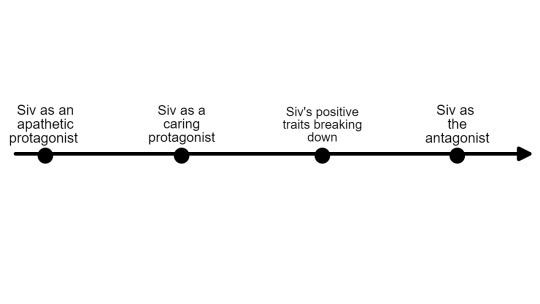
Then lay out ONLY the essential details that connect these important plot points
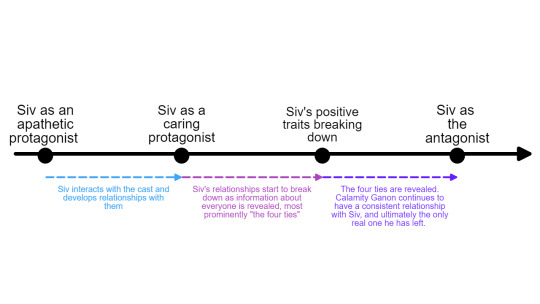
That’s pretty much the basics of what you need to figure out before you start anything else. If you don't have that figured out yet, work on that before anything else.
So the inbetween stuff is basically how you keep the audience intrigued between these parts of the story. You can use different plot points or "twists" to create a system of highs and lows, like a wave. That way, the story is dynamic, people are interest, and it's not boring.
It’s not about being unpredictable, but you just gotta go through trial and error with finding out where to place what details when, so that you can have adequate pay off.
Generally the rule of thumb is, the bigger the ultimate reveal, the earlier on you should lay clues and foreshadowing. Obviously try not to do it to a point where it’s too obvious, as the tool of a plot twist is mainly to get the reaction of “I SHOULD have seen that coming, but I didn’t!” instead of “I would NEVER have seen that coming!”
If you got all that, just place it in your brain for later as we add more to our little diagram.
So let’s structure where we place our “plot twists” and important beats. These have to be essential to connect your bigger plot, or developing one of your character, otherwise they’re just useless and you should cut it. I’m gonna start with the stuff that affects the plot. (Again, trying to be as simplistic as possible.)
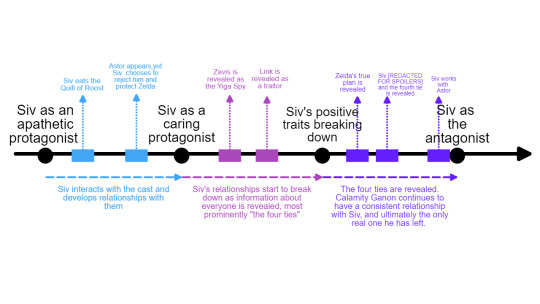
So these beats in the story are essential to connect the main plot points, if you take them out, it doesn’t make sense. The specific cosequences for these “plot twist” are the connective glue that you wrote down earlier. For example, the consequence of Siv protecting Zelda is him solidifying his trust and love for her in that moment, thus his relationship with her develops him into a caring protagonist. The consequence of Zavis being revealed as a spy is Siv starting to question the relationships he’s made, and they start to break down over time. The consequence of the fourth tie being revealed is that it leaves the only intact and ultimately consistent relationship in Siv’s life to be Calamity canon.
Also you might notice that I redaced one of the plot twists for spoilers. BUT, I think this is a good moment to point out that you don’t necessarily need to reveal the information that your characters learn as they happen, because I think setting up forshadowing for the twist itself AFTER it happens can be pretty interesting. The reader knows that something has happened, but now the mystery of exactly WHAT it was can drive the plot further. Anyways.
You have these point, and now you have to figure out what to put inbetween. Again, you have to create highs and lows, and general your twists are your highs (points of extreme action and tension for the reader), so now we establish your lows (points of comedic relief and relaxation for the reader).
But, SURPRISE! You already did that! Your lows of the story are determined by the areas inbetween your plot twists!
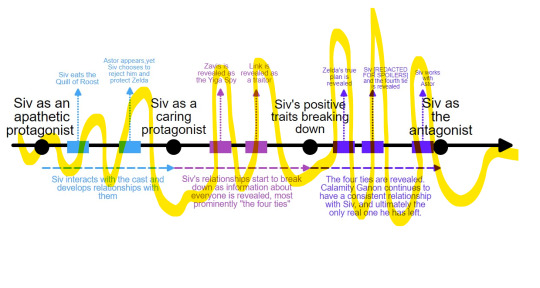
Now if you don't like where your highs and lows are, that's alright, you can move stuff around, again it's a process of trial and error. But the name of the game is pacing, but that's like a WHOOOOOLE OTHER essay about how to pace things, but we're here for deciding where to put arcs so we'll just breeze by that right now.
You also might notice in my badly drawn diagram that the height of the crests of each wave are different, and you'd be right to notice that. It's because I'm assigning a sort of "value" of each plot twist, as as the writer I know how important the impact of wave one is. Generally the rule is the further along you go, the more value ro tension a point has to offer. It'll kinda look like those five act structure graphs your english teacher showed you in fifth grade.
So now FINALLY, you can get a general sense of where to have arcs in your story.
Not every arc is gonna be the same, that's just a given, but you can get a general sense of where certain arcs are based on what you made.
Maybe if you're going for a lighthearted tone, you want every arc to start on a low, and end on a low, like an episodic format. Or maybe if you're going for a tone that's more serious or myserious, you'll be more prone to end arcs on highs. You can problem guess which one I lean more towards.
Quill Boys and co arc: Start on the low of Siv and Zavis hanging out, being pals, end on the high of Zavis' reveal as the spy
A lark flies into the woods arc: low action as Siv and Astor talk, the high of Larc's decision is revealed.
Hollow knight but not that hollow knight arc: The tension continues to rise in the battle, and then a low after the battle is won, but then the high of Link's truth is revealed.
That's how I write my arcs, but sometimes depending on where I want the tone to be, I'm stretch out multiple low-high-low arcs to give the reader a break. But you'll notice as we approach closer and closer to the climax, the frequences of the waves increases, and the length of the breaks decrease. So when that happens, you might need to break your arcs in highs and lows that art part of a bigger wave, similar to how i did #a lark flies into the woods and #Hollow knight but not that hollow knight.
For another example of breaking up arcs to show part of a wave, I did #sibling fights hollow knights and destiny rewrites and #long ago and long away, with the "high" of Zelda's plan being what splits them down the middle.
AGAIN. THIS IS ALL TRIAL AND ERROR AND WILL NOT WORK FOR EVERY TYPE OF STORY. THIS WORKS FOR ME BECAUSE MY STORY IS BASED ON THE IDEA OF UNSEEN INFORMATION AND ULTIMATELY BEING "UPDATED" ABOUT IT, SO THE REVEAL OF INFORMATION PROVIDES A CONCLUSION TO AN ARC
BUT JUST ENDING AN ARC WITH A PLOT TWIST DOES NOT AUTOMATICALLY MAKE IT GOOD. TRUST ME I'VE MADE THAT MISTAKE SOMETIMES [BUT I AM ALSO STARING INTENTLY AT TV SHOWS LIKE SHERLOCK AND LIKE 60% OF DISNEY]
Now, on that final point about foreshadowing. Let's look at those values again?

So, the more impactful you see your plot twist or development, the earlier you should set it up (generally, anyways. there are exceptions)
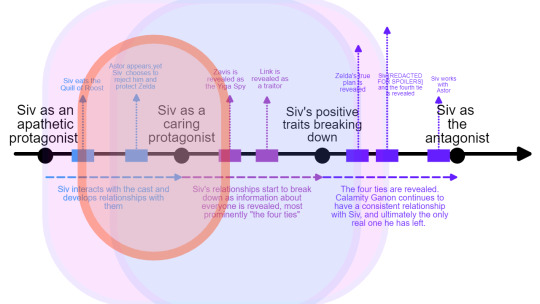
This is an example for the Zavis, Zelda, and Fourth Tie twists. I value the fourth tie as the highest, so I establish it subtly very early. I also value Zelda's plan as pretty high, so I establish Terrako pretty early, and her reveal gives an explanation as to why she's so focus on fixing Terrako, and also explains her reaction to Zavis' reveal. Zavi's twist is important, to who he is, so I set him up right by his first introduction
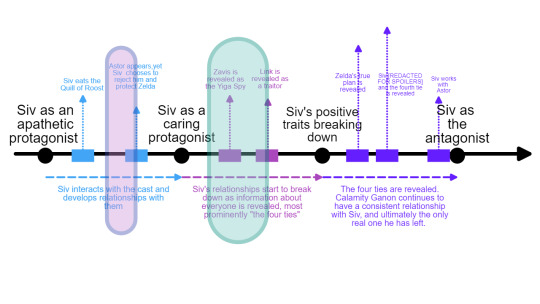
Link's twist is important, but I personally wouldn't value the tension and high of it as much as Zavis'. In addition, I already have a long establish plot twist revealed with Zavis, so I think I want to surprise my audience a bit more by foreshadowing Link's tie only a few arcs before the reveal. Astor's impact is almost better if there's nearly no foreshadowing to him at all, (especially on a meta level) so I think I'll make one off hand mention to him existing and leave it at that.
I think for the most part, the more impact the event has on the development of your story/character, the earlier on you should foreshadow/hint at it.
And I breezed by a lot of shit, like I didn't even TOUCH the character related twists like Sooga and Revali. And there's shit about pacing and timing and conclusions and beginning to arcs and their relations...but I think that's a good enough starting point for your ask.
So keep your arcs dynamic do follow the highs and lows of your story. Make sure they end conclusively (cliff hangers are ok, but don't assume a plot twist in of itself is a conclusion) and foreshadow shit earlier depending on how big of a twist it is
18 notes
·
View notes
Text
A collective post of everything I watched on Netflix in 2020
I finally found the watch history function on Netflix which I wanted in order to reminisce over the TV/film I watched over the last year, including the good and the bad. I’ve included a little round-up of my thoughts for each, as lockdown has got me with plenty of time on my hands. If anyone has watched any of the below feel free to give me a message- happy to discuss anything!
Travelers (season 3) - this was an unforgettable show with some great characters and definitely put me through hell (in a good way), I am a David x Marcy shipper for sure!
IT Crowd (season 4 & 5) - my favourite comedy show ever, and I mean the UK version
Explained (random episodes) - interesting bite-sized episodes on a variety of topics
Sherlock (season 3 & 4) - it kinda went downhill from season 4...and doesn’t help that there is no season 5 in sight
Unforgettable - must be pretty forgettable cause I couldn’t remember watching, a typical revenge plot romp I think
The Mind, Explained - same as for Explained above, except more pyshcological
You (season 2) - binge-worthy! I love to hate Joe Goldberg.
Don’t F**k with Cats - wow, this was disturbing but so gripping.
Jumanji: Welcome to the Jungle - geniunely a good remake and rather amusing
Sex, Explained - as for Explained but a little more intriguing ;)
The Stranger (season 1) - full of suspense and a good binge watch but ultimately full of plot holes with an unsatisfying conclusion
Gavin & Stacey (season 3) - a classic which I only started watching in 2019
Sex Education (all of it) - comedy gold!
Unbelievable (limited series) - very harrowing, an emotional rollercoaster based on a real-life rape case
Atypical (all of it) - light-hearted and fun to binge
The Sinner (season 1) - it was okay... wasn’t spectacular compared to other similar dramas I’ve seen
Love Is Blind (season 1) - cringey but satisfying
In the Shadow of the Moon - I hardly remember this one :)
Dunkirk - a stand-out historical movie
The Stepfather - typical killer stepfather plot but rather enjoyable
The Super - an interesting premise, but not that super
Saw VI - all gore not much plot
Doctor Who (random episodes) - no words needed :D
Louis Theroux and Louis Theroux’s Weird Weekends (random episodes) - I love his style of interviewing - what a man!
The Revenant - a lot of... well, not much
Nightcrawler - it was decent, but something was missing which I couldn’t put my finger on
How To Get Away With Murder (seasons 1-5) - probably my biggest new watch of the year, a rollercoaster of suspense, drama and murder, another season to go...
Ocean’s Eleven - fun but cheesey
Blumhouse’s Truth or Dare - creepy faces and an interesting ending
Eli - it started one way then went another, I wasn’t convinced
Star Trek (2009) - I couldn’t really get into this one...
In the Tall Grass - a lot of running around in grass
Bloodride (season 1) - i loved this, a quirky idea, i binged it
Apostle - intense, a satisfying religious cult horror
The Platform - great idea, not sure on the ending
What Keeps You Alive - what happened in this one again?
History 101 - didn’t watch many episodes :P
The Prodigy - a decent child possession horror
Into the Night (season 1) - really enjoyed this, a highlight of the year for me, hoping for a season 2
It - pretty chilling and creepy, but a tad cheesey
Jurassic World and Jurassic World: Fallen Kingdom - the first one has a brilliant dinosaur fight scene, the second one has too many plot holes and inconsistencies to take seriously
Knowing - a Nicholas Cage sci-fi/apocalpytic classic, pretty decent
Stranger Things (random episodes) - i tried to get my bf into the show but sadly he still isn’t much of a TV fan
Miranda (random episodes) - such fun!
Black Mirror (seasons 1 & 2) - another one i introduced the bf to, i got a bit further with him on this one, the very first episode being the highlight
The Last House on the Left - a decent remake, but nothing outstanding
Dark (season 3) - this, my friends, is one of the greatest shows of all time. want a timey-wimey story where everything is connected and has an amazingly satisfying conclusion? this is the show for you!
The Silence - a bad ‘A Quiet Place’
Geostorm - i’m a fan of disaster movies but this one wasn’t in the same league as some of the greats
Panic Room - a mum and kid hides in the panic room when a group of thugs break into the house, it was enjoyable but not all that memorable
Prisoners - a very long film with some enjoyable parts but overall unsatisfying
Girl on the Third Floor - it was okay, i can’t remember much of it
The Woods (season 1) - another Harlan Coben adaptation- not as good as ‘Safe’ or ‘The Stranger’ but still a gripping thriller
Time Trap - a fun time-travel film with some interesting turns of events
72 Dangerous/Cutest Animals (random episodes) - just ‘cause i love animals
Slasher (all of it) - some very gory deaths, especially in season 3. quite disturbing but keeps the suspense up throughout.
2012 - a guilty pleasure of mine, realistic or not
Kingsman: The Secret Service - a fun spy film, will be looking to watch the second one soon
Blackfish - this was harrowing, it really made me think, but overall i’m on the side of tilikum
Unsolved Mysteries (season 1 & 2) - watching some of these my jaw dropped, love theorising on this kind of stuff
Down to Earth with Zac Efron (season 1) - Zac is great in this, he seems so chill and literally ‘down to earth’
The Call - I love this film, seen it 3 times now
Contagion - very relatable right now, interesting to see the parallels with todays situation
Next in Fashion (season 1) - i didn’t get too far with this, i found it a little superficial
Searching - another of those internet web-cam based films. decent but not memorable.
Non-stop - another Nicholas Cage classic, this time a suspense thriller
Freaks - as the title suggests this one was rather weird, i didn’t quite gel with it
The Perfection - wow, that was an experience. definitely memorable, even if some characters make questionable decisions...
Extraction - not usually a fan of action-type thrillers, but i actually enjoyed this one, plus it has Chris Hemsworth in it!
Line of Duty (season 2) - full of suspense, a great build-up in the first 5 episodes, but the way they tied it up really grated on me
Insidious - watched this one with my sister. a genuinely good horror film on rewatch with an amazing cliff-hanger
A Quiet Place - another one watched with my sister. labelled a horror but its more sci-fi, either way its a classic. bring on the second film!
The Dark Tower - disappointing mostly.
Gladiator - i’d never seen this before and now i understand the hype- what an epic movie!
Criminal UK (season 2) - didn’t disappoint following the exceptional first season
Venom - a fun comedic marvel film, definitely need to watch more from Marvel in the next year- i need an order to watch them in as don’t know where to start
Our Planet (season 1) - chill David Attenborough to put on in the background
The Equalizer - a great action revenge thriller plot with a badass Denzel
Merlin (random episodes) - who doesn’t love a trip down memory lane with some nostalgic bbc merlin?
A Nightmare on Elm Street (2010) - pretty scary remake
The Witcher (season 1) - rewatched in order to familiarise myself again before season 2 - i didn’t realise how funny the show was until this time round, gotta love Jaskier!
American Murder: The Family Next Door - this was haunting
The Haunting of Bly Manor - phenomenal, emotional, creepy, heartbreaking - i much preferred it to Hill House
Abducted in Plain Sight - seriously, how naive are the parents in this? i could have a rant for hours about this!
The End of the F***ing World (seasons 1 & 2) - very bingeable, Alyssa makes me laugh too much, i love how relatable the show is
Fractured - didn’t expect much from this consipiracy-type film but it kept me guessing right till the end
The Ripper (limited series) - very intriguing, but the mysogyny in this was shocking
Inconceivable - a typical mother looking for her baby revenge plot but still entertaining
The Midnight Sky - i’d heard rave reviews for this but was disappointed by a lacklustre plot which was sacrificed for award-winning cinematography
Killer Women with Piers Morgan (season 2) - a pyschological interview series which looks into the mind of murderers, rather interesting
May the Devil Take You - scarier and jumpier than i thought it would be!
So 2020 obviously gave me a lot of time to watch a s**t load of stuff and looking back at it i feel like i got a decent amount of my watch-list ticked off! And obviously this is not including shows watched on other media so there’s that too (a special shout-out to the William Hartnell era of Doctor Who which I watched this year on BritBox). In all, 2020 has definitely introduced me to a few new fandoms and progressed my love for others.
#personal#mine#netflix#watchlist#potential spoilers#spoilers#travelers#it crowd#sherlock#unforgettable#you#jumanji#gavin and stacey#atypical#saw#doctor who#the revenant#louis theroux#how to get away with murder#star trek#bloodride#apostle#oceans eleven#the platform#it#jurassic world#miranda#black mirror#dark#slasher
33 notes
·
View notes
Text
The TJLC Debacle: 3 years out from S4 and counting; the copyright mini-theory; so much salt I’m bloated; but in the end, there is peace (I love you Johnlockers)

Ugh, don't even talk to me about Mary.
Don't even talk to me about the way Mofftiss have said they're sick of responding to fans on the subject of Johnlock. Of how they've said they're "not telling anyone else what to think or write about them" (as if they could stop us; as if they even own Sherlock themselves. Do keep reading, because this point becomes much more relevant and in-jokey later on). Don't even mention how they've bitched and whined incessantly because--god forbid--fans got *really really* into their show and emotionally invested.
They're so eager to discount all the beautiful little moments they wrote as accidents. And Arwel, who planted all those props, continually demonstrates that he's on their side (a not-very in-depth-analysis of his Instagram account and the way he interacted with fans towards the beginning of the pandemic showed as much, but I think maybe he’s grown a bit wiser and quieter since at least in terms of Johnlock and all things elephant-related. I don’t know for sure because I stopped looking.)
Anyway--they'd actually prefer for us to celebrate our own intelligence, is I suppose a charitable way of looking at it: our ability to make connections between things in the show; our metas on symbolism; our insightful fanfic; etc., and denounce them as the bad writers that they ultimately are.
More under the cut.
(This post may be of interest to you especially if you came to the fandom a bit later: multiple links to things of relevance/quotes/explanations appear both within and at the end of this entry.)
Because what makes a writer good?
Well, an ability to make people feel an emotional connection to their work, for one. I know this is just my own perspective, but if not for Johnlock, all my emotion about the show would evaporate. There wouldn't be much else there. Other people might get something, but I wouldn’t. Is some of the writing witty and entertaining regardless of any inferred/implied Johnlock? Yeah but, eh, a lot of shows have some good writing and I just don’t give a damn about them.
What makes a writer good?
Not making promises to the reader/viewer that they'll never keep. Plot holes, leading dialogue ("There’s stuff you wanted to say...but didn’t say it.” “Yeah”) never followed through on, puns that are apparently, I suppose, unintentional (e.g. "'Previous' commander?" "I meant 'ex'").
Uh, not writing continual gay jokes that aren't actually pointing toward the inference that people are making them because there's actually something going on there under the surface. (How about just don't make those jokes ever.)
Not being, apparently, oblivious (? questionable) to the queerbaiting they're engaging in *as they’re writing it.*
Acting like their LGBT audience is in the wrong/the bad guy, instead of choosing to remain respectful in the face of dissent. Instead it's just, "we never wrote it that way" / "We never played it that way."

A lot of those other mildly witty shows don’t actually blatantly drag their most passionate fans face-down through the mud the writers themselves created. Imagine that.
I'm not even a fan of Martin Freeman anymore, for the way he handled the whole thing (getting angry, the comments he made about how the fans made Sherlock “not fun anymore”...apparently Martin’s packing up his crayons and going home?)...no offense to anyone who is still a fan of his. I don’t make it a habit to drag him. I do to some degree understand his frustration with having the whole situation taken out on him--he’s just an actor in the show--but I simply wish he’d remained as cool and professional about it as Benedict Cumberbatch instead of pointing at the fans. You’re pointing in the wrong direction, mate.
What also irks me at the end of the day is this: the subsection of people who legitimately responded badly to the TJLC/S4 debacle and went above and beyond to harass the writers and actors/actresses on social media are *few and far between*, but we've been lumped in with them by what feels like...everyone, Martin included. TJLCers/Johnlockers (not the same group, but often treated as such) have been made to look like a bunch of rambunctious, immature, demanding children time and time and again in the wake of S4.
They'd rather, what, suggest John was so in love with Mary? THAT was the relationship they wanted to uphold in that show as so significant and...what, a demonstration of how honorable it is to respect your heterosexual relationship despite, you know...ANYTHING?
Yeah sorry, I don’t believe in that. John’s text-based affair, whether a disappointment for some as to his supposed character, was a very human reaction and I kinda sorta feel like I would have reacted MUCH more strongly than that had I been John. But nope. He stayed with Mary and was *ashamed* of his wandering eye. Ashamed that maybe he wanted to be admired by someone. I can’t think of a scene, off the top of my head, where Mary ever interacted with John without belittling him in some way--if not with words, then with consistently patronizing glances.
The message here is that heterosexuality is not just acceptable, but VALUABLE, however it manifests--but god forbid anyone see a queer subtext. (Why are lgbt+ writers some of the very WORST offenders where this is concerned? And they defend it! Is this childhood nostalgia/Stockholm Syndrome of the very fondest variety or what? Gay angst is all they got if they got anything at all, so it’s still good enough as far as “representation” goes?)
They really want to tell the story of John as so emotionally/mentally fucked up that he surrounds himself with unstable people time and again. They never give any reason *why* he might do that (which they could have done even soooo subtly), or delve into his past--just, apparently it's okay to assume that Sherlock's comment about "she's like that because you chose her" is exactly that.
No. Sherlock and Mary are NOT the same. Not...*remotely*!
Mary is underhanded and evil. She lies. She manipulates. She schemes. Her “love” is based on selfishness, and her assumption that John is a simpleton and hers to mold. She's in it for herself.
Sherlock hides. He prevaricates. He feels. He loves John. He does fucked up things in the name of love, but always for the benefit of those he loves. When he screws up, which he obviously does, it’s painful to us as the audience because we see that it is painful for him when he recognizes and regrets it.
I have never seen Mary regret anything. Those crocodile tears at Christmas? More manipulation. Inconsistent with anything else we were shown about her as a character.
To even think for a SECOND that people could ship Mary and John and mentally condemn John for cheating on Mary AFTER SHE SHOT HIS BEST FRIEND...as if marriage is the be-all-end-all free pass in which every sin must be forgiven until the end of time...as if John broke any covenant with his wife beyond those she broke from the very moment she walked into his life *with an entire fake past.* Is just. Well. It's asking us to accept gaslighting as healthy, loving, normal, *preferable* behavior, so...given the source that message is coming from, it's all a bit meta.
THAT. Is insanity. Maybe Mofftiss are the sociopaths.
How these men could write characters they themselves understand so little (or tell us they understand so little because their emotional maturity has yet to surpass that of the average three-year-old’s), I will never know. I can only imagine that they have absorbed, by osmosis over their lives, real and nuanced human behavior...then churned it back out again in their writing unaware, a bit like psychopaths who teach themselves what "normal" people do so that they can pass as psychologically sound in regular society.
Remember, we *are* talking about men who do these sorts of things:
Moffat says that Sherlock is celibate and that people who claim he's misogynistic when he does things like make Irene Adler imply she's attracted to the detective (even though she's a lesbian) are, ironically, "deeply offensive" (despite lines like "look at us both" in Battersea. We aren't your therapists, Moffat--we don't care what you meant, we care what you said, and what you *said* was clear. *Implying* it does not let you off the hook).
Gatiss has proclaimed that "I find flirting with the homoeroticism in Sherlock much more interesting" than the idea of ever making a show addressing LGBT issues. (That link is to a reddit forum, and I can't find the original interview anymore, but I assure you I had seen the actual article myself ages back and can't find it online again now along with some of the Martin quotes I wanted to link to. And nevermind what Gatiss has done with LGBT shows/issues since--my focus here is on what he has said, versus what he and Moffat have since claimed regarding their queerbaiting.)
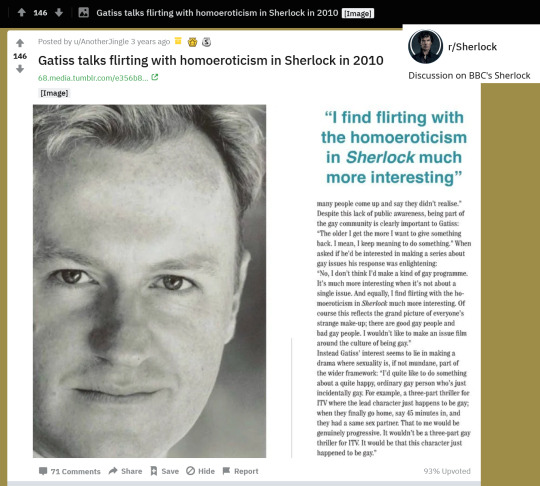
Here’s a transcript of this screenshot:
"...many people come up and say they didn't realise." Despite this lack of public awareness, being part of the gay community is clearly important to Gatiss: "The older I get the more I want to give something back. I mean, I keep meaning to do something." When asked if he'd be interested in making a series about gay issues his response was enlightening:
"No, I don't think I'd make a kind of gay programme. It's much more interesting when it's not about a single issue. And equally, I find flirting with the homoeroticism in Sherlock much more interesting. Of course this reflects the grand picture of everyone's strange make-up; there are good gay people and bad gay people. I wouldn't like to make an issue film around the culture of being gay."
Instead Gatiss' interest seems to lie in making a drama where sexuality is, if not mundane, part of the wider framework: "I'd quite like to do something about a quite happy, ordinary gay person who's just incidentally gay. For example, a three-part thriller for ITV where the lead character just happens to be gay; when they finally go home, say 45 minutes in, and they had a same sex partner. That to me would be genuinely progressive. It wouldn't be a three-part gay thriller for ITV. It would be that this character just happened to be gay."
--End article quote.
And instead, who is canonically gay in the series? Well, Irene Adler. The innkeepers at the Cross Keys. And perhaps most notably, the *villains*, because that's a helpful trope: Moriarty and Eurus are, in S4, both implied to be at least bisexual.
Any character should be able to be any sexuality, this is true. But can we have some main characters, the good guys, give some good representation? Can't we start making that the standard, rather than the villains and the background characters? Because so far, that is the exception and not the rule.
Writers need to be aware of the damage they are perpetuating. We are not quite in a world yet where any character should be able to be any sexuality but isn't, yet we have no problem with saying the villain is LGBT+ or looks different/functions differently than much of the viewing audience.
"Male friendship is important and valid, not everything has to be gay"--this is a popular point with casual heterosexual viewers (and, to my chagrin, some of my LGBT+ friends) who don't fully grasp what "queerbaiting" is, often even when it's pointed out to them.
The lens of heterosexuality is real. My first time through watching BBC Sherlock, I didn't see the Johnlock at all. I had to look for it and read about it. When I saw it, the lens was lifted for me, and it changed my life and the way I view things forever (and for the best).
But back to my point about how little Mofftiss seem to understand their own story/most ardent fans, and then on to my other theory: in S4 it must be that they dropped their “psychopaths emulating empathy” act and indulged in their own "insane wish fulfillment" by doing away with all of the meaning, continuity, and sense. Right?
So, here’s the alternate theory. One which is not, please remember, in their defense.
Remember that S4 is what Mofftiss are *happy* to have us believe is what they'd do with these characters, given the chance to do whatever they wanted. I repeat, in Moffat’s own words: “Insane wish fulfillment.”
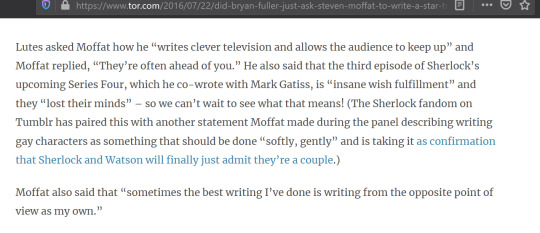
Okay I get it, this pasta has been over-salted.
Without further delay: MY COPYRIGHT RESEARCH THEORY THAT EVEN I DON'T PUT MUCH STOCK IN AND WHICH DOESN’T MAKE UP FOR THEIR CRUELTY EVEN IF TRUE
Part of me also raises an eyebrow at S4 as perhaps an example of the effect of the Conan Doyle estate on any modern production in the US. While it’s true that all of Sherlock is part of public domain in the UK and has been for quite a long time, Gatiss and Moffat still talk about it being partially under copyright. Specifically, the last 10 stories. I’m supposing that this means that because Sherlock airs internationally, or due to whatever contract the BBC has with the Doyle estate, they are still limited by the copyright as to what they can “publish”.
The Doyle estate is known for being a pain in the ass when it comes to abiding by copyright law as everyone else knows and practices it. They’ve tried to argue, for example (in 2013 and, much more recently, with the advent of Enola Holmes), that because Holmes and Watson were not fully developed as their final selves until the conclusion of all 10 stories still under copyright, then perhaps the characters themselves should still be protected, basically, in full.
It’s true that certain elements of the remaining stories are still under copyright here in the US (Watson had more than one wife--uh huh, we have that to look forward to, Johnlockers; the Garridebs moment is still under copyright--yeah, I’m getting to that too; and Sherlock didn’t care much for dogs til later so that’s not allowed either, fuck off Redbeard), but the estate’s problem in 2013 seemed to be based around a fear that *gasp* some day--if not right now!--anyone could write a Sherlock Holmes story in any way they pleased, changing the characters however they wished to and giving those characters “multiple personalities.”
See the following excerpt from the Estate’s case:
“...at any given point in their fictional lives, the two men's characters depend on the Ten Stories. It is impossible to split the characters into public domain versions and complete versions.”
(Click for full transcript.)
Obviously, by this point, that’s been done in multiple iterations. So I dunno. Their argument was *more* than muddy to begin with--they just grasp at straws to stay in control, it seems.
But okay. Backing up: wasn’t there sort-of a Garridebs moment in S4?!?? you cry. Yep. But imagine this: the Conan Doyle estate taking Mofftiss to court to argue that they depicted the Garridebs moment--a moment still under copyright--in The Final Problem.
Did they, though? Did they really?
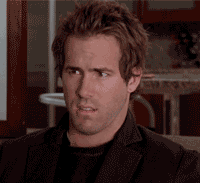
The fandom cried out about the ridiculousness--the utter disappointment--of that moment when it was shown. It was not what we would have expected/wanted. We didn’t see John injured, Sherlock reacting with tender outrage to the good doctor’s attacker.
Instead we saw some ludicrous BS that was as bad as the clown with the sword-gun-umbrella. More of that.

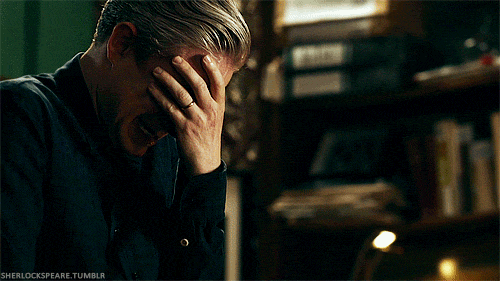
I think Martin probably found that it was easy to produce real tears when he thought about how fucking terrible the S4 scripts were.
Ahem. Yet, this all seems very Mofftiss-flavored in terms of humor.
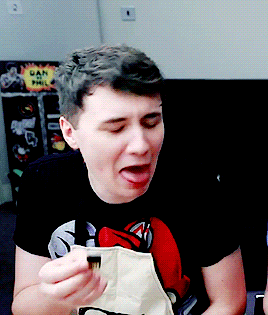
I can all-too-easily imagine them saying, “HA. We’re going to show some of these supposedly copyrighted things--and if they take us to court, they’ll be laughed out of the room.” Could that explain some of the overall S4 fuckery?
Sherlock wasn’t supposed to like dogs til later stories, as previously mentioned-- is that why Redbeard pulled a “Cinderella’s carriage” and transformed into a pumpkin (Victor Trevor)? Hmm. Sigh.
It...doesn’t actually appear that the estate has any qualms about taking laughable stuff to court, I mean...*shrug.* They have the money to do it, and money is the name of the game, because you’ve got to pay for rights (cha-ching sounds).

Yep, it does seem that the estate is open to the copyrighted materials being made reality, but who knows for what price or with what caveats. The BBC isn’t, so far as I’ve ever heard, known for throwing money around. Early Doctor Who would be so much less entertaining if they’d had any sort of budget. (And in fact, more of the older episodes would exist, but apparently the BBC--in part to cut costs--reused some of their tapes.)
My bottom-line bitter is this: Mofftiss do like to amuse themselves. To please themselves and no one else, as they’ve shown time and again. Sure, they could do whatever they wanted with S4...and they did...but they were also cruel about it, and that’s what I’ll never forgive them--OR the BBC--for.
A lot of fans gave up after series 4. I was very nearly one of them. I was angry, like just about every other Johnlocker and/or TJLCer, but I was really truly heartbroken. I couldn’t look at fanfiction. My days were full of bitterness and I keenly felt the lack of the fandom outlet that had become so essential to my mental well-being. I didn't know how to overcome the disparity between TJLC and what the show actually was. I didn't know how to separate the things I loved so much from the shitty writers and the way the BBC handled things with their whole response letter (that atrocious, childish blanket response they sent to everyone who complained about S4, not just the Johnlockers/TJLCers. Related to your complaint or not, if you filed one post-S4, this was the response you got). I still boycott BBC shows/merchandise, just by the way.
I tried to link to the blanket response letter but the link didn’t want to work (it’s an old reddit post; I had difficulty finding a copy of the letter elsewhere though at one point it wasn’t so hard...Google is weird these days y’all...tell me it’s not just me) so here’s a screenshot:
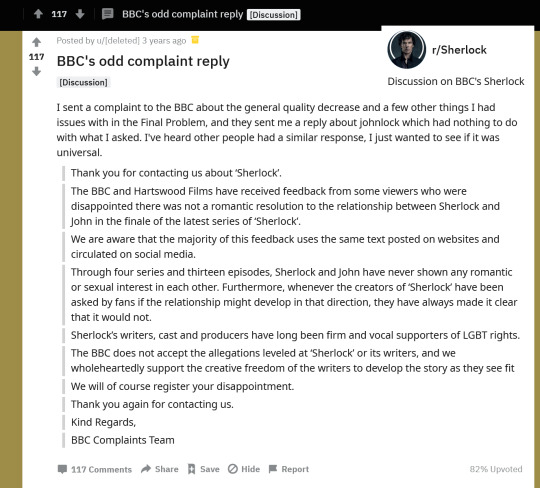
Transcript:
“Thank you for contacting us about “Sherlock”.
The BBC and Hartswood Films have received feedback from some viewers who were disappointed there was not a romantic resolution to the relationship between Sherlcok and John in the finale of the latest season of “Sherlock”.
We are aware that the majority of this feedback uses the same text posted on websites and circulated on social media.
Through four series and thirteen episodes, Sherlock and John have never shown any romantic or sexual interest in each other. Furthermore, whenever the creators of “Sherlock” have been asked by fans if the relationship might develop in that direction, they have always made it clear that it would not.
Sherlock’s writers, cast and producers have long been firm and vocal supporters of LGBT rights.
The BBC does not accept the allegations leveled at “Sherlock” or its writers, and we wholeheartedly support the creative freedom of the writers to develop the story as they see fit.
We will of course register your disappointment.
Thank you for contacting us.
Kind Regards,
BBC Complaints Team
So how about that? *Did* they “register our disappointment”? We can actually check that. The BBC’s website has a monthly summary of complaints received. So what did they receive in January 2017, the month S4 aired?

Huh, what do you know. Sounds like that blanket response was exactly the “fuck you” it came across as.
But the show--the FANDOM--had filled a need in my life, and so I had to own that and make it mine, or just...let something in me die: something that felt like an actual vital organ. I had to decide that these characters mean something to me beyond what anyone else tells me they should. I had to accept my own perceptions as truth, as I do with everything else in my life. I had to overcome the idea of canon as law (BBC Sherlock isn't canon anyway; ACD is canon. BBC Sherlock is, in the end, badly written fanfiction--or--worse?--decent pre-slash fanfiction distorted by consistent lies and the hazing of the LGBT audience, topped with the dumpster fire of S4′s incoherent nonsense).
I had to take the good and throw away the bad, just like anyone else who chose to stay. The good bits of the show...dialogue, yes. Plot points, yes. These awful writers did write some good stuff sometimes.
They just broke all the unspoken rules of what not to do to your audience. And then did and said everything they could not to apologize, and to justify their own failings. Which, in the years since I began shipping queer ships beyond any others, I have unfortunately experienced more than once.
So, my vulnerability has been yeeted into the vacuum of broke-my-trustdom: no one can tell me what things should mean to me. I will decide.
I decide that all of the FUCKING AMAZING writing in the Sherlock fandom is a staple in my life that makes it worth living. And that that's okay. And takes precedence over anything the writers or anyone else associated with the show could ever say or do.
Johnlock can not be taken away. It doesn't belong to them. It never did, even if they brought us to it. It belongs to us. To the group of amazingly creative, brainy, empathetic, resourceful, vibrant, resilient people who make up this fandom.
So thank YOU, all of YOU, for giving me Sherlock, Johnlock, and TJLC.
I am SO SAD for those who never found a way to make peace with this fandom again. Let me just say that I understand that inability entirely.
I am fortunate that I found the ability in myself to cling to the joy (something it has taken my whole life to be able to do). I hope others will who haven’t yet but wish they could.
Let Mofftiss and whoever sides with them stay angry and bitter and vicious, always looking over their shoulders for anyone who dares to whisper about subtext.
I’m proud to be part of what they’re whispering so angrily about.
Thanks for sticking it out if you made it this far. I know this was very self-indulgent and rambly.
Articles of interest:
A Study in Queerbaiting (Or How Sherlock Got it All Wrong) by Marty Greyson
“We never played it like that.” - Martin on Johnlock
Henry Cavill on the Enola Holmes lawsuit
More on that--and by the way Sherlock isn’t allowed to like dogs
The way Sherlock creators told fans Sherlock & John aren’t gay is so rude
Especially for those new to the fandom who may not know the distinction between TJLC and Johnlockers and want to know more about TJLC's evolution/what it is/meta through the years
Moffat's view on asexuality, offensive to me in particular *as* an asexual person (same article where he claims he isn't misogynistic): "If he was asexual, there would be no tension in that, no fun in that – it's someone who abstains who's interesting."
Yet he says Sherlock isn't gay or straight and that he's trying to keep his brain pure which is a "very Victorian attitude"
(Nice historical research there, Moff--actually the Victorians were sex-positive).
Sherlock fans were robbed of the gay ending they deserved
Benedict Cumberbatch has lashed out at his Sherlock co-star Martin Freeman over his negative attitude towards fans
BBC complaints January 2017
Martin Freeman: 'Sherlock is gayest story ever'
From 2016: UNPOPULAR OPINION: "Sherlock" Isn't Sexist or Queerbaiting; It's Actually Trying to Stage a Revolution
Queer-baiting on the BBC's Sherlock: Addressing the Invalidation of Queer Identities through Online Fan Fiction Communities by Cassidy Sheehan
#bbc sherlock#bbc sherlock salt#sherlock s4#sherlock holmes#acd#john watson#sherlock copyright#mofftiss#queerbaiting#johnlock#tjlc#johnlock fanfiction#fandom#writing#fandom life#sherlock fandom#tjlc fandom#johnlock fandom#sorry for the salt sometimes you just need somewhere to put it all#the bbc
37 notes
·
View notes
Text
How MBTI & Enneagram affect character relatability
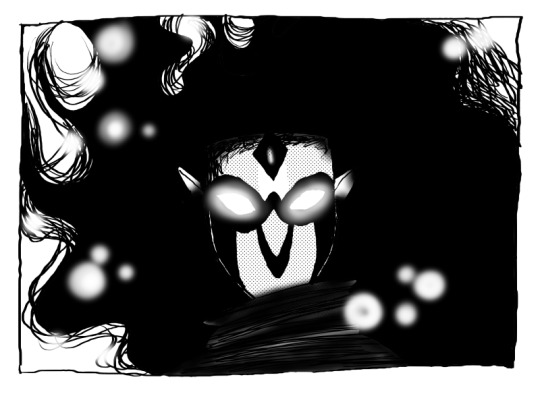
I have a theory, and I’m going to illustrate it with the help of Adora and Shadow Weaver. I also have a personal story there.
Fun fact:
I share an MBTI type with Shadow Weaver (INFJ)
and an Enneagram type with Adora (Social 9w1).
(Not going to go into more specific subtypes right now.)
What makes this interesting to me, is how I am, in this case, pretty much a perfect example of how people tend to relate to fictional characters with similar Enneagrams, rather than similar MBTI types. My “evidence” is anecdotal of course, but I have noticed a pattern there. I think this tendency is at least one of the reasons behind some interesting phenomena in fandom and might set some light to questions like why some characterizations are more popular in fanfiction than others. (Such as why people write characters like Keith, Sasuke, Zuko and Catra as artsy emos.) But I digress. (Might get into that another time, though.)
I had watched SPOP about three times before it even crossed my mind that Shadow Weaver shared a personality type with me. While it was apparent to me the first time around, that I shared a personality type with Adora. So, why? Because one is a hero, and one is a villain, and I would rather identify with the hero?
That seems like a nice and clean answer, but I don’t think it’s quite that simple.
I think it has more to do with how I, and I think most people, relate to fiction from an emotional point of view. We tend to watch and read stories for emotional reasons, more than intellectual ones. Not that intellectual reasons don’t play a part, just that the driving force is often emotional. We’re looking to connect emotionally with the characters, otherwise we would be watching a documentary or reading a science book instead. At least that’s how it works for me, and in my experience, a lot of other people.
MBTI is about cognition, while Enneagram is about motivation. Sometimes I like to distinguish MBTI as your “intellectual type” and Enneagram as your “emotional type”. At least from that angle, it makes perfect sense, that we would relate to a character with a similar emotional type: a similar Enneagram, when we are immersed in something with our emotions.
And this is true of MBTI “thinkers” and “feelers” alike. I can’t count how many times I’ve seen INTPs claim Sherlock Holmes simply MUST be an INTP because they relate to him. When I first got into MBTI, I was guilty of that too. I thought every character I emotionally related to, was an INFJ. LOL, NOPE. I just didn’t know anything about Enneagram. After getting into that, I can easily see that the characters I most relate to, tend to have a very similar Enneagram type to mine.
Actually, it was the fact that I related to Adora so much that made me especially blind to the possibility that I might relate to Shadow Weaver in any way. That’s why I find this personal example so juicy. It’s because in the emotional dynamic between Adora and Shadow Weaver, I related to Adora a 100% and then some. I’ve had my Shadow Weavers, and reacted to them in a way a Social 9w1 will. We are people pleasers because we lack a solid sense of self, and we do exactly as we are told to avoid conflict, separation and loss (our worst fear).
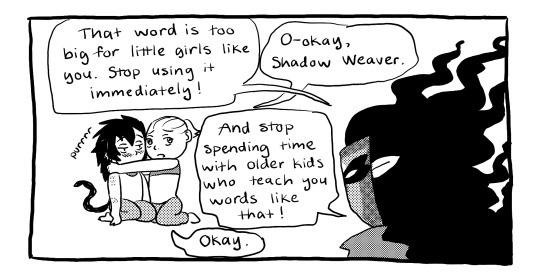
In the worst case scenario, we believe we need to constantly excuse our very existence.
(Like seriously, it can get ridiculous. When I was around ten, if I was at a friend’s house, I didn’t have it in myself to ask for a glass of water if I was thirsty. Even when it was offered to me without asking, I found it hard to accept, because I had done nothing to pay for that water. Even though I live in a country with the best access to clean water in the world, so one glass of water costs practically nothing.)
Given all that, it makes sense that I wouldn’t even consider relating to Shadow Weaver, because to me she very much represents everything toxic that I experienced as a child and needed to unlearn in adulthood.
But after taking a step back from that emotional angle, it’s pretty easy for me to see that cognitively speaking, I’m not Adora, who is an ESTJ. I’m pretty much the polar opposite. Which is Shadow Weaver, as weird as it feels to me.
As INFJs, we are very good at understanding another person’s psychological make up. We easily take anyone’s point of view and use that to influence the people around us. We don’t naturally gravitate towards the spotlight or a leadership role, we are at our most effective in one-on-one communication.
Obviously, Shadow Weaver uses all this to manipulate and abuse people, to get her way and her narcissistic supply. I use it to help my friends see their problems more accurately, and themselves in an encouraging light. (And to write fiction!) Shadow Weaver uses it to cause conflict between people by distorting their view of reality, I use it to ease conflict by an attempt to bring more clarity.
But that doesn’t mean we are not both INFJs, because we definitely are. Upon a closer look, I find many things about Shadow Weaver relatable.
She’s definitely an introvert driven by her internal vision, her idea of power, and she’s thinking leaps ahead, like she does the moment she sees Adora as a baby. (Ni) She’s a great communicator, but it’s more of a means to an end to her than it is a passion. (Fe) It seems like the very concept of power interests her more than what practical things she can do with it (Ti).
And her vision is SO MUCH BIGGER than her abilities. That’s exactly how I’ve felt my whole life, because inferior Se will do that to you. You don’t see the step-by-step approach to your GRAND VISION even though you can see the end result so clearly in your head that you swear you can touch it. Your insight can be so accurate that you can (deliberately, or accidentally) make people think you’re connected to some mystical higher power even though you’re mostly just full of sh*t (=ideas, abstractions).
It’s like, your whole life, you’ve been working towards one goal, one vision, that is just on the other side of a river, but you CAN’T FIGURE OUT HOW to get across. If you could JUST do that, then on the other side ALL your dreams would come true, everything you’ve worked for, for your entire life would COME TOGETHER in pure AWESOMENESS because you’ve been thinking, and planning and fantasizing and putting all of your mental energy into it, and just aching to get across that river. And then, a f*cking ESTP (Catra) shows up, farts a bridge, gets to the other side, and once they’re there, they have NO. CLUE. WHAT. THE F*CK. THEY. ARE. EVEN. DOING. THERE.
I’m getting carried away.
Emotionally, or, motivationally speaking I don’t relate to Shadow Weaver. Like, at all. I couldn’t care less about having power over other people. I can’t bear the thought of hurting another person. (I still cry at night sometimes because I once called my brother’s helmet “stupid” as a child, when he was annoying me.) I don’t need to be the most powerful or put others down in order to feel whole. The idea of hindering someone’s growth into their happiest and truest self is horrifying to me.
But still, my brain works similarly to hers. I’m full of ideas that are connected to the same big vision I’ve had my entire life, but getting there efficiently enough requires a lot more brain work and trial and error from me than some other types.
Emotionally speaking I relate to Adora so much. I get anxious if I’m not constantly doing something “useful”. I feel responsible for other people’s happiness. I feel tremendous guilt every time I have to say “no” to someone in order to rest and take care of myself. I feel like a failure when I’m not able to fix someone’s problem. I feel obligated to sacrifice myself because I “can”. When I was voted the least desirable girl in my class, I was just relieved it wasn’t anyone else, because I knew my friends would have shattered if it were them. (Hint: it wasn’t because I had better self-esteem. It was because my self-esteem wasn’t a concern for me in the first place.)
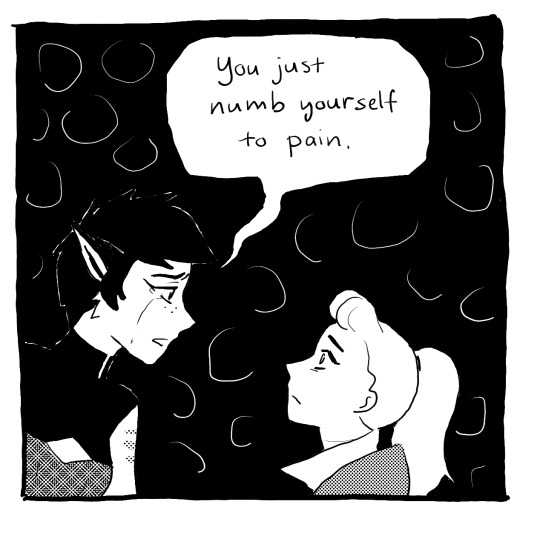
And yet, I’m also nothing like Adora when it comes to cognitive make up. It would be interesting to dive deep into why the ESTJ 9 combination is totally fascinating for me, but this post is too long for that already.
My point is:
1) In terms of relatability in fiction, Enneagram might play a bigger role than MBTI.
2) Sometimes people get into heated arguments about a character’s type because they can only see a character they relate to, as their own type, and that’s intellectually dishonest. (As a personality junkie, I care.)
3) It’s OKAY to relate to a character with a different MBTI from you. MBTI is not everything. Enneagram is not everything either. There might be another reason.
4) Sometimes people seem to feel like they need to be like their favourite character in EVERY way, to justify their experience of relating to that character. Well, you don’t. Having the same cognitive type doesn’t automatically lead to the same motivational type, or the same life experiences, or the same relationship style or the same neurotype, or anything else. These can all be different, and your experience is valid no matter where the relatability comes from.
5) If you relate to a character, there’s a reason for it, and you’ll get the most out of it, if you try to discover that reason as honestly as possible and not automatically assume it must be your MBTI (or something else). Those four letters are not the most important thing about anyone, so you don’t need those to “claim” a character to your side of things.
6) You have no obligation to emotionally relate to a character with the same type as yours. I can assure you my feelings towards Shadow Weaver did not become any warmer after discovering we shared an MBTI type, and that’s okay too.
40 notes
·
View notes
Text
The Silver Screen Savant, pt 2- the Meh, the Bad and The yikes.
Hello Writers!
Last time here on Starry Starry Write, I talked a little about Autism in the media and my personal experiences therein. Today, I’d like to go a little broader, and tackle the topic from a macro perspective.
In recent times, you’ve probably heard “Representation Matters” oft repeated. Especially in prominent talking spaces like social media. But what does that mean, exactly?
Why “Representation Matters,” and how.
The short answer:

Diverse representation in media tells us that everyone has a place in the world. That everyone’s story matters.
The long answer:
It’s no secret that we begin engaging with media at a young age. When I was growing up in the 90’s and 00’s, TV and video games were often the babysitters of my peers. I was one of the few kids in my neighborhood whose parents weren’t divorced. The kids I knew? Not so much. Most of them were raised by single parents, grandparents and of course-the boob tube. I personally prefered books, when my mom wasn’t yelling “it’s too nice out to be holed up in that dark bedroom!”
Now, don’t mistake my preference for some kind of intellectual superiority. I watched plenty of TV too. Besides, books aren’t magically out of the equation. Printed material is our oldest form of media. And- often just as problematic. Though I will say- I saw a much broader range of people on covers adoring library shelves than I ever did titles on a TV roster. But, I digress. The point is: for many of us, consuming media begins at an early time of our life. And that’s where the problem starts. Even in my childhood, where The Magic School Bus, Hey Arnold, and Sesame Street showed people of all kinds, I can point to many that did not. Especially not people like me. Which did me a grave disservice. I didn’t know I was on the spectrum for a long time, and when I finally found out, I was horrified, thanks to what I had seen on TV.
Because media is not only a wonderful way to learn about people that don’t look, act or sound like us. It also informs our ideas of who we are, and what we can be. Whether we like it or not: it shapes how we understand the world. And it doesn’t stop with Childhood.
Time Changes Much, but not all.

Things are better now. Well, a little bit, anyway.
As an adult, I see more people like me on the screen nowadays. Which is nice.
Ish.
Why “ish?” Well…
Frequently, these “noticeably different” characters (read: Autistically coded) are branded “NOT AUTISTIC!” You heard it here first, folks! That one character (insert your favorite) is Totally Not Autistic. Despite being written in a way that gives every indication otherwise.
*Facepalm*
Now for some examples, which we’ll call the “Meh,” “The Bad” and the “Yikes.” For “fun,” we’ll also go into the off-air perceptions of the characters.
The “Meh.”
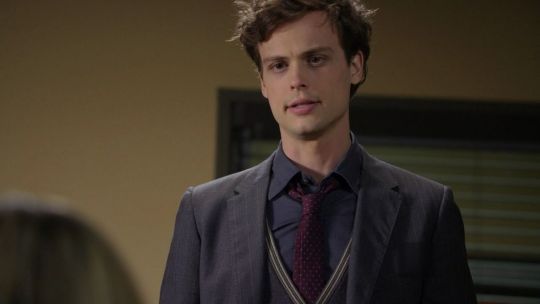
First on the list is Dr. Spencer Reid, from CBS’s “Criminal Minds.”
Dr. Reid is the youngest member of the FBI’s Behavioral Analysis Unit, having joined at the age of 22. He holds three B.A degrees in Sociology, Psychology and Philosophy, as well as three Ph.D’s in Engineering, Chemistry, and Mathematics.
He also has the social skills of a limp dishrag. Wait, what’s that? High Intelligence + Low Social Awareness? Hmmm…Then there’s his restrictive behavioral patterns, obsessive interests, and general “quirkiness!” that we could talk about. But let’s hear a quote from the actor who plays him, Matthew Gray Gubler:
“..an eccentric genius, with hints of schizophrenia and minor autism, Asperger’s Syndrome. Reid is 24, 25 years old with three PH.D.s and one can’t usually achieve that without some form of autism.”
Hoooo-boy. I could go into all the things wrong with this, including why the term “Asperger’s” is both horrific (TW: Eugenics,Ableism, N*zis) and harmful. However, today we’ll simply leave it with the fact that this term is no longer applicable, having been reclassified in 2013 as part of Autism Spectrum disorder.
The “Bad.”

Next up, we have Will Graham, from NBC’s Hannibal.
Like our first example, Will works for the FBI. He’s a gifted criminal profiler with “special” abilities, namely hyper empathy, which allows him to reconstruct the actions and fantasies of the killers he hunts. He’s intellectually gifted, hates eye contact, socializing, and prefers to spend…most of his time…alone.
Oh dear. Haven’t we been here before? But, I mean, he doesn’t have Autism! The show runner says so!
For Will Graham, there’s a line in the pilot about him being on the spectrum of autism or Asperger’s, and he’s neither of those things. He actually has an empathy disorder where he feels way too much and that’s relatable in some way. There’s something about people who connect more to animals than they do to other people because it’s too intense for whatever reason.
You can’t see me right now, but I’m cringing. A lot. This is just…ugh. I mean, for starters, I know a handful of autistic people who struggle with hyper empathy, which can make social situations overwhelming and hard to navigate. In fact, I happen to be one of them. Plus, there’s a cool little thing about how, frequently, people on the spectrum more readily identify with animals. But, y’know. Who am I to say? I’m just someone, one of many, who’s dealt with this my whole life.
Now, onto the “Yikes.”
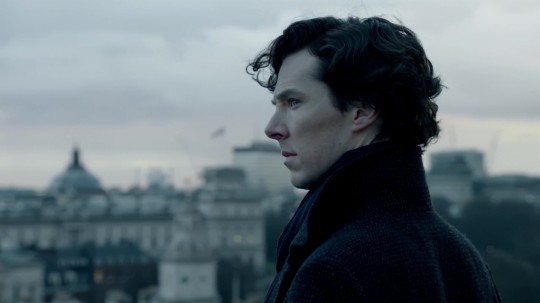
*sigh*
And finally, we have BBC’s Sherlock, a modern adaptation of Sir Arthur Conan Doyle’s renowned “consulting” detective, and probably the most famous fictional character of all time.
Now, I’ll start by saying that the BBC incarnation is not the first to be Spectrum labeled. In fact, Sherlock was my childhood hero, and the first “person” I saw referred to this way. My aunt, an avid reader herself, casually remarked to a friend “I’ve always wondered if Holmes is Autistic,” after I came yammering on about how fantastic the books were. Had I not been champing at the bit to get back to my reading, I might have asked her what that meant.
I also believe this fandom driven speculation is why many detective type characters (see above) are often coded as Autistic, intentionally or otherwise.
In this New York Times article, Lisa Sanders, M.D. describes Holmes traits:
He appears oblivious to the rhythms and courtesies of normal social intercourse — he doesn’t converse so much as lecture. His interests and knowledge are deep but narrow. He is strangely “coldblooded,” and perhaps as a consequence, he is also alone in the world.
Now, before we go any father, let me take a moment to defend his creator. During the time Sir Arthur Conan Doyle first created his most famous work, Autism was not known. That isn’t to say it didn’t exist. We’ve always existed. In fact, it’s now believed that the Changeling Myth, a common European folk story, was a way to explain Autism. In one telling (there are a few) children displaying “intelligence beyond their years” and “uncanny knowledge” were imposters, traded out by Fae creatures for offspring of their own. Children believed to be “Changlings,” regretfully, often came to a bad end. A chilling reminder that the stories we tell impact our real lives.
So while Autism was at least somewhat recognized, it did not become its own official diagnosis until 1943.
Meanwhile, Sherlock Holmes was first published in 1892. Now, as a writer who often draws from my personal reality, I imagine Doyle probably “wrote what he knew,” which is to say, acquainted with one or more Autistic people, he used them as inspiration.
On the other hand…
BBC’s Sherlock first aired in 2010. And while one might argue that the writers simply capitalized on the Autistic fan-theory, or took already available traits and exaggerated them for their version… they left a lot to be desired. Autism aside, this new Sherlock is…well…an asshole. Narcissistic, abusive and egocentric (to name a few) he sweeps his caustic behavior under the rug of “high functioning sociopath,” and blytly ignores the consequences.
Which is a major problem. Because while doing this, he’s still “obviously” (at least in the Hollywood sense) Autistic. In my previous post, where I said some characters are “too smart™, and logical© to ever have feelings, friends or empathy,” this is what I meant.
This is bad. We’re looping right back to Representation Matters. Bad representation, and the navigating of such, is just as important for writers to think about as good representation. Maybe even moreso. Because bad representation paints real people into cardboard, stereotyped people-shaped things. It otherizes. And it’s harmful. You would not believe the people I’ve met assume I’m not Autistic because I’m not an egotistical jerk. Why? Because they watched, you guessed it, BBC Sherlock.
Confession time:

Now here’s my little secret:
I love all of these characters. They are some of my favorite on tv. Why? Because for good or ill, I recognize myself in them. Finally, I can turn on the TV, and see myself. Or, somewhat, anyway.
My favorite character out of this list? Loath though I am to admit it… Is Sherlock. See, what those well meaning folks didn’t know (the ones who say I’m I’m “too nice,” to be Autistic) is… well, if we’re being honest, I wasn’t always nice. A few years ago, I was that guy. I was a jerk because I thought I was the smartest person in the room. Which is really not a good look. In fact, sitting down and watching the first season of sherlock, (around three or four years after it came out) made me realize how much of a jerk I actually was.
There are other things there too. Things that tie me to all these characters, that I didn’t list. But that’s for another today.
For now, I’d like to add a caveat or two:
1) I’ve watched all the shows listed above, and adore them. As I mentioned, Sherlock is my favorite. He’s also the one I’ve watched the most (Repeatedly, in fact. Whoops.) and I recognize it’s not all bad. In the end, he learned to treat people better (somewhat) and certainly became more human over time. And, there are other deeply problematic elements of the show I’d like to tackle, eventually.
*cough* Queerbating! *cough*
2) I’m well aware that the above cases are all thin, white, able bodied, “straight” males. But I chose these characters for a couple of reasons. One, they’re the most prominent type on TV. Again, we loop back around to representation, and why we need more positive, diverse examples of it.
And finally-
3) In my last post, I mentioned I’d give some “good” instances of Hollywood Autism trope. But I didn’t exactly do that. Partially, because half way through, I thought…perhaps…I’m not the best to judge what might be a good Autistic character. I mean, I’m sure someone will read this and think my current aforementioned characters are fine. Heck! They might even argue my perception here, and say the characters are just fine. I accept that. In my life, both on and off the page, I recognize that I cannot, should not (and don’t want to) speak for an entire community.
Because of this, I cannot tell you how to write a “good” Autistic character, or what media is “acceptable.” I can’t even really tell you what a bad character is. Sure, I have a lot of opinions about it. But- if you’re on the spectrum and like and identify with the above? That’s fine. I mean, even with all the problems I noted (and some I didn’t) I certainly do.
On the other hand, if you’re a writer, and you want to write a character from this (or any, for that matter) community you aren’t part of, I caution you.
Do your research. Preferably from multiple credible sources.
Talk to people on the spectrum about what it’s really like. (Though try to steer clear of asking for emotional labor.You could, say, hop on reddit and ask the community there, for instance, which is a no pressure way to obtain potentially decent info.)
Finally, whatever you do, remember this-
Autistic people can look like anyone. We can act, and think and be different, like anyone. We are real, living, breathing people. Not robots, not sob stories, not tropes. People. So if you write about us, write us like people. And your work will be all the better for it.
-Your Loving Vincent
#autism#autistic problems#actually autistic#autistic experiences#autistic life#media#hollywood#film#TV#television#will graham#nbc hannibal#hannibal#sherlock#bbc sherlock#criminal minds#arthur conan doyle#writers on tumblr#writing#writers#tropes#spencer reid#autism in media#representation matters#autistic representation#liturature#own voices#do your research#emotional labor#caution
7 notes
·
View notes
Text
Frank Hudson, Greta, Margaret, & Mary
(PSA: If you’ve been tagged in this post, it’s because I’m crediting you or linking to a meta you wrote! I particularly linked a lot of things at the end I think could be tangentially related. No pressure to read all of this!)
Please allow me to take you on a journey in which I present a theory:
Mary is Frank Hudson’s daughter from a relationship with another woman, and part of her motivation (as a villain, as Moriarty’s agent/possible successor) is to get revenge on Sherlock for having killed her father all those years ago and ruining the drug cartel empire.
I was calling this a crack theory, but uh, given that I’ve now written thousands of words connecting weird dots, I’m gonna say maybe this is potentially not as far-fetched as I initially thought.
Before Sherlock series 4 came out, we were given this delightful niche little “clue” in a Youtube video on the official channel:

It’s always struck me as odd that this was specifically shown in a video advertising / leading up to series 4... when it seemingly never connected to anything. Why this, of all things?
Let’s review what we know about Mr. Frank Hudson.
• He was sentenced to death in Florida; Sherlock ensured his execution. (ASiP)
• He was executed for double murder and the execution was via lethal injection. He was arrested for “blowing someone’s head off.” (TSoT)
• According to Mrs. Hudson, about their relationship: “It was just a whirlwind thing for us. I knew it wouldn’t work, but I just got sort of swept along. And then we moved to Florida. We had a fantastic time, but of course I didn’t know what he was up to” and “It was purely physical between me and Frank. We couldn’t keep our hands off each other.” What Frank was “up to” included a drug cartel and “all the other women.” (TSoT)
• Mrs. Hudson was a typist in Frank’s drug cartel (and an exotic dancer, which is in YouTube videos in-universe). This is also the scene where she’s present to hear enough to figure out that Mary shot Sherlock; in the original script, it’s made obvious that she was eavesdropping even after walking out. (HLV)
• We’re also given repeated reminders in TLD that Mrs. Hudson was/is somewhat of a badass. She tells Sherlock “you’re not my first smackhead, Sherlock Holmes,” and whether or not any of that (the revolver, the kidnapping of Sherlock, the car) is actually literally real, I take it mostly as a blatant reminder that Mrs. Hudson has a past filled with “not good” people.
A lot of this info is given in more comedic moments... but I think because it is repeatedly mentioned with consistent detail, especially largely in season 3 when Mary arrives (partially to mirror John/Mary’s doomed relationship), it shouldn’t be swept aside.
Speaking of Mary, let’s get into it.
In ACD’s The Sign of Four, Mary Morstan’s story centers heavily around the loss of her father. That’s also the story that involves the Agra treasure, and Mary notably receives 6 pearls in the mail as part of the mystery. Keep all of this in mind because it’s going to be relevant as we go.
First, let’s roll all the way back to The Abominable Bride.
(All transcripts I will be quoting are from the inimitable Ariane DeVere.)
Giles, & Morse Hudson
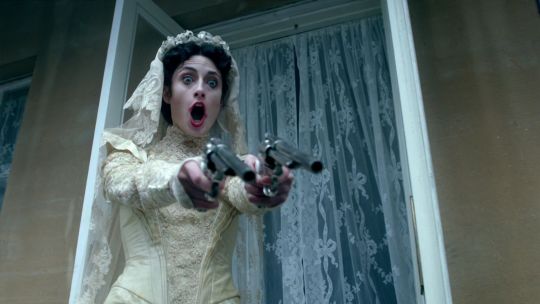
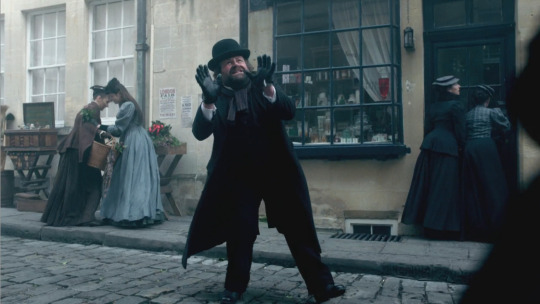
The abominable bride herself–who I trust we all know mirrors Mary at this point lol–stands on the balcony and aims her guns at people on the street while saying “You?” / “You, or me?” One of the people she aims at is this man, who is listed in the credits as Giles. I always found it odd that he was named, so I decided to look him up in relation to Sherlock Holmes.
“Giles” connects to Giles Conover, the criminal in the 1944 Sherlock Holmes movie The Pearl of Death. That movie is loosely based on ACD’s The Adventure of the Six Napoleans. In the movie, Giles (who is not in the ACD story) stole the Borgia Pearl and hid it in a bust of Napoleon. In case there’s any doubt, we can know for a fact that Moffat and Gatiss are familiar with this movie because they referenced it in TGG previously; the Golem assassin is a nod to The Creeper.
So I was like, why that movie specifically? What’s significant, and how would that connect to the bride?
And as I’m sure you’ve figured out by now... they later referenced that movie again in TST. The writers called back to both the ACD story and the 1944 movie, very specifically.
Referenced movie details I noticed in TST include the following: Sherlock calls Lestrade “Giles.” The Borgia Pearl (movie phrasing, as opposed to “the black pearl of the Borgias”) is mentioned multiple times; we’ll go back to that. We are also pointedly told by Ajay that one of the members of AGRA was killed via a broken back, which is how a murder happens in the 1944 movie.
As for TST’s references to the original Napoleon story by ACD... there are many, but there’s one thing they pointedly didn’t reference (unless I missed it) that I find interesting: in the ACD story, 3 of the 6 busts were at the shop of a Morse Hudson. Beppo, the criminal in the story, worked at Morse Hudson’s shop to have access to the locations of those 3 busts. Even in The Six Thatchers version on John’s blog, Beppo is the criminal but Morse Hudson was not mentioned.
So I thought... alright, Morse? What morse code have we seen in the show? Well, there’s UMQRA, from The Hounds of Baskerville.

I poked around and some genius anon on @inevitably-johnlocked‘s blog once said that if you encode UMQRA with HOUND using a vigenere cypher, you get BAKED. Mary bakes her own bread, according to Sherlock’s deductions in TEH. The abominable bride, in the above scene, shoots at/into a bakery.
Edit: @rosie_ww on Twitter aka @silverybees pointed me to this, from THoB:
SHERLOCK: You’ve been to see Mr Chatterjee again.
MRS HUDSON: Pardon?
SHERLOCK: Sandwich shop. That’s a new dress, but there’s flour on the sleeve. You wouldn’t dress like that for baking.
(Friendly reminder that shortly thereafter we find out that Mr. Chatterjee has other women)
Does this morse code / BAKED business necessarily mean anything by itself? No, and of anything in this post, it’s the biggest stretch. But it’s still kind of wild, because let’s recap so far:
• We have Morse Hudson in The Adventure of the Six Napoleons, a story which is heavily referenced in TST
• TST heavily connects to Mary / AGRA (we’ll get to how specifically)
• TST also heavily connects to The Pearl of Death, which connects to TAB
• And not only that, but The Pearl of Death connects to the exact scene in TAB where the bride shoots @ Giles and the bread shop. The bread shop could connect to the UMQRA morse code in the show... meaning “Morse” (code, and therefore Hudson) could then connect to Mary.
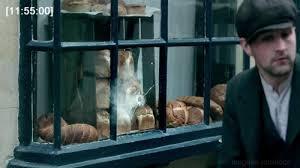
Morse Hudson -> The Six Napoleons -> TST -> The Pearl of Death (“Giles” etc.) -> TAB (“Giles”) -> Mary, the bride
Oh what a tangled web we weave. That’s a Hudson to Mary.
But let’s keep going. Better stuff to come.
The Black Pearl of the Borgias In TST
Let’s play the game of following the trail of the Black Pearl. Shout out to @miadifferent and @impossibleleaf, because their combo post here I came across was very helpful for showing me the best way to write this out to make it easily understandable. I will be quoting / paraphrasing them below!
The first time we hear about the Pearl, it’s from Mycroft, who connects it to Moriarty’s final activities:
MYCROFT: In the last year of his life, James Moriarty was involved with four political assassinations over 70 assorted robberies and terrorist attacks, including a chemical weapons factory in North Korea and had latterly shown some interest in tracking down the Black Pearl of the Borgias, which is still missing by the way, in case you feel like applying yourself to something practical.
We also learn that the Pearl is somehow connected to London.
HOPKINS: Interpol think, the case of the Borgia Pearl trail leads back to London, so..
So we have Moriarty -> Black Pearl -> London...
And next up, there’s Sherlock’s “fake” deduction about Greta Bengtsdotter (who has always very obviously made us all think about Mary.)
SHERLOCK: Your wife is a spy. That’s right. Her real name is Greta Bengtsdotter. Swedish by birth and probably the most dangerous spy in the world. She’s been operating deep undercover for the past four years now as your wife for one reason only: to get near the American embassy which is across the road from your flat. Tomorrow the U.S. president will be at the embassy as part of an official state visit. As the president greets members of staff, Greta Bengtsdotter, disguised as a twenty-two stone cleaner, will inject the president in the back of the neck with a dangerous new drug hidden inside a secret compartment insider her padded armpit. This drug will then render the president entirely susceptible to the will of their new master, none other than James Moriarty. Moriarty will then use the president as a pawn to destabilize the United Nations General Assembly which is due to vote on a nuclear non-proliferation treaty tipping the balance in favour of a first strike policy against Russia. This chain of events will then prove unstoppable thus precipitating World War 3.
The name “Greta” is derived from the name Margareta, which comes from the Greek word margarites. It means pearl. Further versions of this name are Margarita / Margaret / Maggie.
Thus, we add her in: Moriarty -> Greta -> Black Pearl -> London
So when Sherlock finds the AGRA stick in the busts of Margaret Thatcher, he says to Mary...
SHERLOCK: I was so convinced it was Moriarty, I couldn’t see what was right under my nose. I expected a pearl.
Sherlock expected to find a pearl (Greta / a spy), but instead he found AGRA/Mary’s identity. He actually found what he was looking for, but he just didn’t recognize it.
And it actually still makes sense:
Margaret Thatcher’s bust -> Black Pearl -> Greta (“pearl”, spy) -> Mary (spy) -> AGRA memory stick
That’s how it went in the plot. It’s a subconscious connection.
So what’s ACD have to say about all that then?
This is the point where I remind you...
In ACD’s The Sign of Four, Mary Morstan’s story centers heavily around the loss of her father. That’s also the story that involves the Agra treasure, and Mary notably receives 6 pearls in the mail as part of the mystery.
So all of this does have connections back to ACD canon; who is surprised?
But what do we know about Mary’s past from the show’s canon in His Last Vow? Let’s look at some other reminders.
SHERLOCK: By your skill set, you are – or were – an intelligence agent. Your accent is currently English but I suspect you are not. You’re on the run from something; you’ve used your skills to disappear; Magnussen knows your secret, which is why you were going to kill him; and I assume you befriended Janine in order to get close to him.
+
MAGNUSSEN: All those wet jobs for the CIA. Ooh! She’s gone a bit... freelance now. Bad girl.
Mary’s not English; she could be Swedish, she could be American, but regardless–Sherlock deduced she’s a linguist in TEH. And either way, she’s worked for America.
Americans crop up a weird amount in BBC Sherlock (and ACD canon too really), and usually in negative contexts. I just want to highlight one American connection from The Abominable Bride, about Emilia Ricoletti:
SHERLOCK: So she decided to make her death count. She was already familiar with the secret societies of America and was able to draw on their methods of fear and intimidation to publicly – very publicly – confront Sir Eustace Carmichael with the sins of his past.
HOOPER: He knew her out in the States. Promised her everything... marriage, position – and then he had his way with her and threw her over, left her abandoned and penniless.
Also, where was it that Mr. Hudson had his drug cartel? Oh yeah. Florida.
We’ll go back to that.
More Margarets In BBC Sherlock
So we’ve officially got one connection where Margaret relates to Mary. TST makes that pretty clear.
Now, where else have we encountered the name Margaret in the show?
Three places (at least, that I’ve caught):
1. A Study In Pink.
The first victim of Jeff Hope the serial killer is Sir Jeffrey Patterson. He was having an affair with his personal assistant Helen, despite being married to his wife Margaret Patterson.

It’s a well-known fact in this fandom that the victims in ASiP are considered mirrors for John Watson, highlighting things that would lead to his own unhappiness/death–possibly even by suicide. (TJLCE video) So, let’s say Jeffrey Patterson is a mirror for John.
Helen the personal assistant (who says “I love you”) is, perhaps, a mirror for Sherlock. She’s wearing a deep purple shirt.

Does that connect Margaret Patterson, who insists her husband was happy, to Mary?
MARGARET PATTERSON: My husband was a happy man who lived life to the full. He loved his family and his work – and that he should have taken his own life in this way is a mystery and a shock to all who knew him.
[looks at John’s unhappiness in HLV after a month of marriage, looks at series 4 theories about John faking his suicide / trying to commit suicide, laughs nervously]
Well. Moving on.
2. The Hounds of Baskerville.

Project HOUND was a CIA Classified / American project that Major Barrymore was involved in. The Major is apparently a fan of Margaret Thatcher, and the password to his laptop is Maggie. Sherlock types “Margare” then hesitantly backtracks and writes Maggie and it works. It’s worth noting that in the script it was drafted to just be Margaret.
3. The Sign of Three.

MRS. HUDSON: My best friend, Margaret – she was my chief bridesmaid. We were going to be best friends forever, we always said that; but I hardly saw her after that. [...] She cried the whole day, saying, “Ooh, it’s the end of an era.” She was probably right, really. I remember she left early. I mean, who leaves a wedding early?
So in BBC Sherlock, the name Margaret is connected to...
• The Margaret Thatcher busts in The Six Thatchers, which connects to Mary/AGRA/pearls/Greta the Swedish spy
• Margaret Patterson, the wife of a mirror for John who was the victim of murder that masqueraded as suicide. This Margaret insists that the John mirror was happy in their marriage, but the John mirror was having an affair with a Sherlock mirror
• Project HOUND, of the CIA. I find this exceedingly interesting because the name "Margaret” has connections to Moriarty/Mary, and this could mean it’s safe to guess that this case is/was connected to the wider Moriarty web. We see Sherlock hallucinate Moriarty when drugged by the fog, sure, but otherwise Moriarty’s handiwork supposedly isn’t involved in this case... but maybe it was indirectly, by Mary in the CIA. Just ruminating.
• Margaret was Mrs. Hudson’s best friend, who left the wedding early when Mrs. Hudson and Frank got married
Re: that last bullet point, here is what I am suggesting as a possibility: Margaret was one of Mr. Hudson’s “other women.” Margaret left the wedding early because she was sad about the marriage, obviously, but maybe she wasn’t in love with Mrs. H like we would naturally assume (per Sherlock leaving the wedding early because he loves John). Maybe Margaret was in love with Mr. Hudson.
Maybe Mary is the daughter of Margaret and Mr. Hudson, and (as previously stated) she’s motivated to get revenge on Sherlock for killing her father and ruining the drug cartel empire. Who knows what would’ve happened to her mother Margaret, in that case, too.
This is speculation, of course, yes. Yet [waves to all the ridiculous web of connections I’ve delved deeply into, and the Frank Hudson hangman] can you blame me?
But, maybe you’re wondering... why would I think she’s the daughter of a Hudson specifically, even aside from all this Margaret stuff?
Well.
Hudsons In ACD Canon
Where is the name “Hudson” used in ACD canon, other than for Mrs. Hudson?
Three places (that I’ve caught; my ACD canon knowledge is limited):
• Morse Hudson in The Adventure of the Six Napoleons, as discussed above; not mentioned in BBC Sherlock canon for some reason, yet strongly tied to the story that inspired TST.
• A name drop of “Hudson” in The Adventure of the Five Orange Pips.
Quick run-down of some aspects of this case: the client, John Openshaw, asks Holmes for help because a series of mysterious letters seems to be connected with the recent suspicious deaths of his uncle Elias and his father Joseph. The letters included 5 orange pips, and KKK on the envelope. When his uncle received his letter, he burnt a bunch of secret personal papers. One paper survived; it’s on that paper that we see Hudson’s name, associated with the KKK, and otherwise oddly unrelated to the case.
Holmes moved the lamp, and we both bent over the sheet of paper, which showed by its ragged edge that it had indeed been torn from a book. It was headed, “March, 1869,” and beneath were the following enigmatical notices:
“4th. Hudson came. Same old platform.
“7th. Set the pips on McCauley, Paramore, and John Swain of St. Augustine.
“9th. McCauley cleared.
“10th. John Swain cleared.
“12th. Visited Paramore. All well.”
Here are other ~features of interest~ in this case to me: Openshaw’s uncle Elias was a planter in Florida for many years. Florida is mentioned by Holmes as a “notable” state where the KKK formed a branch; the others are Tennessee, Louisiana, the Carolinas, and Georgia (hello to Tbilisi, Georgia being in TST seemingly at random). It is also mentioned that the fear of someone or something is what drove Elias from America to England. There’s also a very random name drop of “Mary” in this story that doesn’t relate to the case, told as part of Openshaw’s story, in which I can only assume Mary was a maid?
OPENSHAW, QUOTING UNCLE ELIAS: “They may do what they like, but I’ll checkmate them still,’ said he with an oath. ‘Tell Mary that I shall want a fire in my room to-day, and send down to Fordham, the Horsham lawyer.’
The fact that the name Mary manages to be in this cracks me up.
The orange pips / secret societies in America / etc. all heavily tie into The Abominable Bride, and the women’s hoods were visually reminiscent of the KKK. Sir Eustace’s line in TAB of “Death” (when he receives the pips) is a direct quote from Elias in this story when he receives his pips–and a quote that Mary echoes in TST when she completes Vivian Norbury’s sentence in the aquarium.
VIVIAN NORBURY: I’m just like the merchant in the story. I thought I could outrun the inevitable. I’ve always been looking over my shoulder; always expecting to see the grim figure of...
MARY: Death.
So, in summary we have: a name drop of Hudson in a story that factors in Florida, Georgia, pips, secret societies, the KKK, and even a name drop of Mary.
• Hudson is the criminal in The Adventure of the Gloria Scott.
This case is the one Holmes credits as his first case, and it inspired his future profession. He’s telling Watson the story. It happened in his university days and centers on his friend Victor Trevor (TFP says hi, lmao). More specifically, it centers on Victor Trevor’s father. I won’t go into all the details, and the plot summary on Wikipedia is good if you’re curious, but–
A quick run-down of some ~features of interest~ in this case: Mr. Trevor the elder is being blackmailed by the criminal Hudson because of their old criminal past together with others. Hudson is threatening him with exposure / public shame, and Mr. Trevor is forced to employ him. Victor gets pissed about it and eventually upsets Hudson enough that Hudson leaves in a very “this isn’t over” kind of way. Later, Mr. Trevor dies from a stroke after receiving a letter that threatened him via a skip code. It is a skip code of specifically every third word, beginning with the first.
Full skip code message: "The supply of game for London is going steadily up. Head-keeper Hudson, we believe, has been now told to receive all orders for fly-paper and for preservation of your hen pheasant's life."
Decoded message: "The game is up. Hudson has told all. Fly for your life."
(It’s not a game anymore...)
Who do we have in show canon who recognizes a skip code on sight of specifically every third word, beginning with the first?

All together now: Mary.
(Bonus points for “Save John Watson” being the phrase Mary says in her creepy posthumous DVDs. Bonus points x2 for the fact that this text was sent by Magnussen, the “Napoleon of blackmail,” to Mary when he was supposedly trying to find Sherlock’s pressure point. But anyway!)
Another feature of interest about the Gloria Scott case: Holmes deduces that Mr. Trevor was once connected to someone with the initials J.A. whom he wanted to forget, guessing it was an old lover. Mr. Trevor momentarily faints in shock. Holmes guessed this based on an old arm tattoo that Mr. Trevor had tried to get rid of, where the initials are blurry. This later turns out to be wrong, because Mr. Trevor’s previous name was James Armitage–J.A.–when he was a criminal, and that is the reason behind the tattoo. (JA? AJ / Ajay? Much to think about)
The J.A. tattoo deduction was referenced in The Six Thatchers, when Sherlock deduces that the client had a Japanese girlfriend he is now indifferent about.
SHERLOCK: You’ve got a Japanese tattoo in the crook of your elbow in the name ‘Akako.’ It’s obvious you’ve tried to have it removed.
KINGSLEY: But surely that means I wanna forget her, not that I’m indifferent.
SHERLOCK: If she’d really hurt your feelings, you would have had the word obliterated, but the first attempt wasn’t successful and you haven’t tried again, so it seems you can live with the slightly blurred memory of Akako, hence the indifference.
I’m bothering to highlight this in TST because after Sherlock explains it, the client remarks upon it being “simple”... and that’s when Sherlock immediately launches into his ~fake~ long-winded deduction about his wife being Greta the spy, as I already talked about above. Wild.
One last fascinating thing about the Gloria Scott: this case is referenced in 2 other ACD stories–The Sussex Vampire (John texting in TST), and The Musgrave Ritual (TFP). Gotta love that.
So, uh, what if Mrs. Hudson’s “case” (getting her husband executed) was one of Sherlock’s “firsts” that inspires him to become a consultive detective full-time? We’re told in ASiP that he ensured Frank Hudson’s execution “a few years back.” The inexactness of that year amount drives me bonkers, but I think it’s potentially plausible.
Short Coda: Ghost Stories...
In Mr. Trevor’s reply to Holmes’ (incorrect) J.A. tattoo deduction, he includes the following line:
“Of all ghosts, the ghosts of our old loves are the worst.”
Mark Gatiss talked a lot about ghost stories. In the Sherlock Chronicles book (which I own) teasing series 4, he said, “I can certainly give you one word. Ghosts...” and in this interview he said “There’s a conspiracy theory about everything and they’re almost the modern equivalent of ghost stories. And the great thing is, you can have all the tropes of a ghost story. . . There are lots of people in happy marriages who turn out to have terrible secrets or to have done some awful deed in the past that must be paid for in the present. In Doyle’s stories, those are the ghosts you need to worry about.”
And here are the lines we get from Holmes in The Abominable Bride about ghosts (that aren’t literal):
You may, however, rest assured there are no ghosts in this world... Save those we make for ourselves.
+
We all have a past, Watson. Ghosts – they are the shadows that define our every sunny day. Sir Eustace knows he’s a marked man.
+
The avenging ghost – a legend to strike terror into the heart of any man with malicious intent; a spectre to stalk those unpunished brutes whose reckoning is long overdue.
While typing, I’ve now galaxy-brained my way to the realization that Mrs. H was canonically an “abominable bride” to Frank Hudson and literally murdered him (with Sherlock’s help), just like the women in the special. She’s also shown as one of the women ignored/disparaged in the special (”I’m your landlady, not a plot device”) but just isn’t shown in the crypt/society. So that’s, uh... interesting.
In (Semi-)Conclusion: A Summary
We have the following significant points at minimum:
• A Frank Hudson clue in a series 4 video
• One reference where Mary is undeniably connected to a Hudson who was a criminal in ACD canon (skip code)
• One ACD Hudson who was heavily connected to The Six Napoleons story, aka The Six Thatchers
• One ACD Hudson name-dropped in a story that heavily connects to The Abominable Bride, and Florida
• A bizarre pile of evidence that all Margaret mentions in the show could relate back to Mary the ex-CIA spy, in some way or another
• A Margaret connected to Mrs. Hudson who could’ve been in love with Frank Hudson (in Florida)
• The overall theme of s4 being ghosts from past deeds and un(happy) marriages coming to haunt people. And lest we forget, “ghost” Mary literally haunts Sherlock and John after her “death.”
Does that cover it? I feel like that covers it.
Of course, I absolutely could be reading into a ton of things that are unrelated, but... Who is to say ¯\_(ツ)_/¯
Random Related Stuff
Not required reading, but while poking around, I’ve found other things that could or could not connect to the above theory. I’m just gonna... info dump it right here. It could all be meaningless, it could all connect, it could be unrelated! You decide! Lots of meta links involved below, so credit where credit is due.
• I knew I wasn’t the first to come up with this concept/possibility of Mary being a Hudson. While building this post, I ran a search and came across this old one by @the-7-percent-solution, who posited there’s a letter game at play of AEIOU involving Mary’s monstrous regiment of various characters and connects Amo/Love to Mary. I love this concept, and while I do think there are other elements/aspects in play for the plot besides just this, that post still has pieces that can work nicely; doesn’t matter that it was written before TFP aired.
• Frequently thinking about how Sherlock said “Mrs. Hudson? Leave Baker Street? England would fall,” because what does Mrs. Hudson do in TLD? She leaves Baker Street.
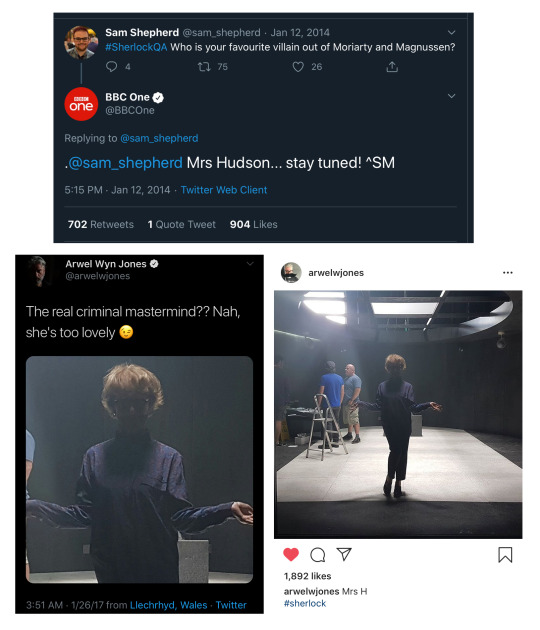
• All of the above cursed elements haunt me. (Arwel’s Instagram post was April of this year.) Note: there’s another tweet Arwel jokingly posted of this photo years ago, but that tweet’s caption was connected to Brexit based on dates / my memory (i.e. “England has fallen”), so I’m not including it lol.
• In TFP, when Mrs. Hudson is vacuuming, she’s listening to Iron Maiden’s “The Number of the Beast.” The lyrics we get are “666, the Number of the Beast. Hell and fire was spawned to be released.” The other time 666 is mentioned was by Mary in TST, in reference to Rosie.
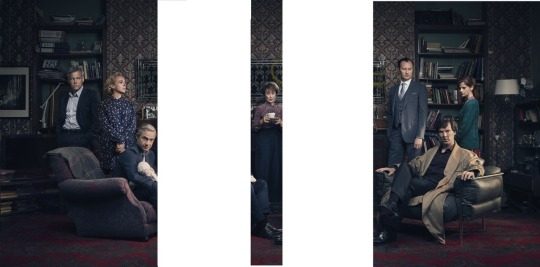
• Mrs. Hudson is in the center of the 221B promo pic for series 4, as noticed by @sherlocks-salty-blog.

• This cursed pic of Mary’s "ring from her past” on top of a series 4, episode 3 script (??) that Amanda took has haunted me since she tweeted it. Mary wears this ring on-screen in TEH, and you can see it when Sherlock deduces her.

• The Gabrielle Ashdown passport (in TST) is from America.

• Janine (who many of us notice is likely involved with Mary / Moriarty of course) often wears pearls, as @sherlockmeta noticed. Mary also wears pearl earrings in series 4 promo shots but never in s4 episodes (that I can find/remember). I also always think that Mary and Mrs. Hudson are dressed very similarly in s4 promo images (see all promos here).
• @raggedyblue discussed how Sherlock’s window deduction in TLD sounds a lot like Mrs. Hudson’s kitchen in 221A, and how a sheet of paper being pinned/folded is an opposite element in ACD’s The Sign of Four. The re-folded paper was a map leading to the AGRA treasure, and Mary found it in her father’s desk. Brilliant catch. Of course, in the show, the paper says Miss Me which is also heavily connected to Mary.
• The mystery of the little girls with blond and braided hair, as compiled by @ebaeschnbliah, is also going to haunt me. I suggest reading the post, but minor summary: during s4 setlock, there was filming with Ben and Mark at Ogmore Castle with a little girl "wearing a skirt or dress, and her hair was blonde and in pigtails,” and she was running circles around Sherlock. There are two separate reports from people who saw this and mentioned it had to do with Mary; at first glance it bears similarities to Eurus scenes we got in TFP, but seems different in description. This also brings to mind the little girl with blonde braided hair in TEH at the bonfire, who notably wears a bright red jacket just like Mary. And there’s also a doll with blond braided pigtails in Magnussen’s mind palace.
• @gosherlocked has posts about “The Children of Sherlock” (part 1)(part 2) that highlight how children are frequently victims in this show. Metaphorically, I find this interesting if Mary plays a role of a “wronged child” avenging her father, regardless of age.
• Let’s talk music in TLD–or at least, one piece of it. When Mrs. Hudson drops the teacup, Mozart’s “Andante From Piano Concerto #21” plays. That specific second movement was used in the 1967 Swedish film Elvira Madigan. Sweden, of course, immediately reminded me of Greta the spy (aka Mary) being Swedish. After I realized this info, I ran a search to see if anyone else had mentioned this movie and I found this post, where @tjlcisthenewsexy and @possiblyimbiassed discussed how it’s a story of 2 doomed lovers who die via suicide-by-revolver. This is significant because Sherlock drops a revolver to catch the tea; death replaced by (gay) love?
• Speaking of Sweden: in The Game Is Now, Sherlock is abroad in Sweden. This is mentioned more than once: first, in this audio message between Sherlock and Mycroft (“Sweden sends its regards.” “It does?” “No, not really.”). This audio message also includes “This is not an international game of sardines.” Fish reference? Aquarium?
The second Sweden mention is visually, in this video. See below. (Also, in both, the characters say “real people,” which I can’t help but feel is a fourth wall break of them being fictional?)

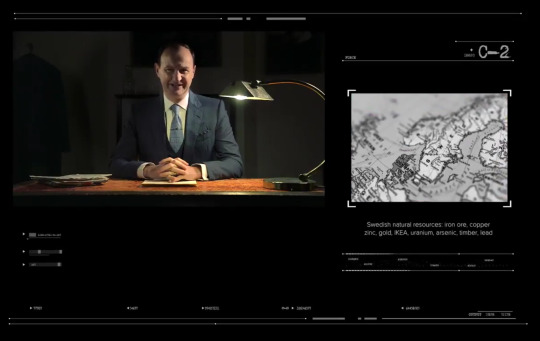
I hate this Sweden stuff specifically. Thank you.
This post is so much longer than I expected it would be, thank you for reading all of this if you did, Johnlock is real, Mary is a villain, etc.
Come yell at me on Twitter @CharCubed!
Also, I made a secret sideblog @frankhudson to just reblog meta or info I might want to be able to find later lmao. Feel free to poke around if you want.
#sherlock meta#mary morstan#frank hudson#mrs hudson#the six thatchers#TST#margaret#the abominable bride#TAB#Greta Bengtsdotter#the borgia pearl#ghost stories#mark gatiss#ACD canon#Arthur Conan Doyle#what the fuck else did I talk about?#sherlock holmes#sjkdfjsfnksjdnfkjdbf#meta#sherlock#bbc sherlock#the sign of four#the gloria scott#the six napoleons
20 notes
·
View notes
Text
For the July celebration of Sherlock’s Ten Year Jubilee I am continuing what I was already doing the rewatch:
“Look at you and John.” Superquickly “What about us?”
The theme of this episode is John and Sherlock being defensive about their relationship.
(Okay that is John’s theme in general, but Sherlock isn’t usually.)
Wait, did Henry and Sherlock just decide to ignore that John went off on his own? Both of them?
They do play with some classic horror staples like the scary sound with an innocent origin and jump scares.
Ohh, that sideways glance at John as he dismisses the hound, not realizing that Sherlock lied when he said he didn’t see it.
The way the scene is filmed whenever there’s a closeup of Sherlock with John in the picture almost looks like they are separated and then superimposed. Sherlock’s doubts are separating them.
Spock as a Vulcan was not free from feelings but rather constantly keeping them under check. He also claimed to be quoting an ancestor when saying that “whatever remains” quote, so a descendent of Doyle? SH is canonically fictional in the ST universe.
Getting sidetracked.
John had much better patient relation with Henry. Why did he think repeating Sherlock’s name was going to help?
John looks pissed.
“Look for the dog/woman” (I am not even attempting to write out the French) classic crime novel theme with a canine twist. Usually it’s about looking for motive though.
A bit silly that they don’t notice the man who screamed “NOTHING WRONG!” pointing at them just a minute later.
Still don’t get quite why John is so pissed before Sherlock tells him to leave him alone. Sherlock is upset and not handling it well but John takes it personally?
Maybe the emotion got to him too?
For the first time I saw “diana” in Henry’s flashback. His memory is clearing up.
All those other guys, just looky-loos? Except they came in their cars which isn’t the most discreet peeping tool out in the moor, so are they waiting their turn?
Sherlock knows John’s type but still doesn’t realize that he belongs to it.
Henry’s like “I knew I shouldn’t have gotten the ironic cable package”
“Only a nutter if you’re wrong”
Aww, even when things are rough John is more concerned with Sherlock than the case. His music even chimes in.
But here comes the party crasher.
Frankland is almost too obvious with that sabotage.
Omg! The Netflix subtitle referred to them as “sambo”! A serious couple who live together! It’s like whoever’s translating this thought there’s no point in being subtle about the “live-in PA” implications.
Yeah, no, John. Frankland may have fooled you with his schtick but he clearly knows who Henry’s therapist (and other weak points) is.
And then not at all subtly implicating Stapleton. I think someone went to the same deflecting-guilt coach as the president!
Look on the bright side John, for once the girl thought you had a thing for a guy that wasn’t Sherlock.
He really likes standing on that cliff. (When you are tall but still want to be tall.)
“Oh look you’ve got damp” is about my level of small talk.
Act eccentric enough and you can sneak out some sugar without raising questions.
Between Sherlock standing dramatically in high places and spotting John looking concerned in a cemetery...
UMQRA didn’t lead anywhere but sex.
A serious discussion about their friendship and Sherlock’s humanity in a cemetery...
Sherlock technically doesn’t insult John, he just calls him not a genius. Still doesn’t mean that John is average (or less) in intellect.
Sherlock, dear Sherlock. It really seemed more plausible to you that John was in on some Mycroft conspiracy to call Lestrade Greg, than the possibility that it is his given name?
I’m assuming this is where the mystrade ship set sail since it’s the first real connection of any kind between the characters.
Not your handler.
And again John shows his cleverness with appreciation from Sherlock.
The tenderness in “you don’t have to keep apologizing”.
Oh poor John. If you don’t take sugar in your coffee it can taste outright nasty when it’s added, especially if there’s no milk. But Sherlock just pouts the slightest bit and John weakens.
The Sherlock mirror was going to put the dog down but couldn’t.
I don’t get the denial about Sherlock being autistic when they have John mention aspergers. Of course the stigma is so strong you have plenty of people saying aspergers isn’t autism at all, which is sort of like saying hay fever isn’t pollen allergy.
It’s plot convenient that they go to Baskerville but is it just for the literally lab condition? He does analyze the sugar there.
John smiles a bit at “could be dangerous”. At this point that sentence should be engraved in their wedding rings.
I wonder what he promised Mycroft in return. “No fat jokes for a week.” “A year.” “Fine.”
You really feel for Henry.
The aerosol is dispersed in a room with the warning “Keep out! Unless you want a cold.” COVID-19 premonitions in my 2012 episode of Sherlock?
Also, how many others were unwitting test subjects?
Clearly light sensitivity is a symptom. Obviously didn’t come up in Dewer’s Hollow.
John trying to call Sherlock with the John music, ahh.
There’s almost no time between “can you see it” and Sherlock’s appearance so he must have been close by.
Sherlock has at least the morsel of decency to look guilty when John says he was wrong.
Why is everything about the bunny the absolute funniest thing?
A jellyfish!
Also Sherlock sneaking glances at John while doing lab work...
I had to look up Aequorea Victoria because I almost thought they picked it for the Victorian reference, but it is best known as a source for GFP (green fluorescent protein). They did their homework.
It may be a bit silly, but I really like the mind palace sequence.
It only works because Sherlock at some point read about CIA classified projects. I feel this is an untapped bit of his background. How much work has he done for his brother?
He figures out that Barrymore feel such a familiarity with Tatcher that he would refer to her by Maggie.
Aerosol Dispersal, how is that not what you focus on, Sherlock?
People make fun of the “top secret sweaters” but 1) people print sweaters for the silliest reasons and 2) it probably started out as a team name thing for the scientists involved before things went haywire and the project shut down. The project H.O.U.N.D. may have been a collective team name that ended up attached to the disaster. They made those sweaters thinking they were going to do a lot of other projects which they presumably didn’t.
Goddammit, Sherlock! You know a mind altering fear drug is around and you tell Lestrade to bring a gun? All John said was that Henry attacked her, although I guess he heard Louise saying gun.
There was a lot that I had no further comment on.
“Why not kill me?” “Because he needed to discredit you.”
:|
Don’t know if I’d look so relieved by the idea of dying from an explosion. But it does look like he’d rather die than face it, and he may have been tired from the secret keeping and the conspiracy upon conspiracy.
Sherlock did see why they didn’t put the dog down, but this episode in general enforces the “playing Sherlock Holmes” for John’s benefit. It’s possible that his main takeaway from their fight was that John doesn’t like him having feelings.
Ahh, I see. I guessed John figured out that Sherlock “drugged” him back when he was angry about sugar. The realization now is that Sherlock locked him in the lab.
It’s so mean and so funny. I feel bad for laughing and yet I do.
Okay here he calls John average.
John wants him to admit being wrong but Sherlock fears that he will lose John’s interest then. “Won’t happen again.”
Poop jokes! Kind of feel that was specifically to take advantage of the “go see a man about a dog”.
Wonder what’s on Moriarty’s mind?
#rebecka’s sherlock rewatch#sherlock#johnlock#john watson is bi#suicide mention#little bit#10yearsofjohnlock
6 notes
·
View notes
Text
CHANGING OF THE GUARD
________________________________________________________________
A metaphorical reading of Sherlock BBC, The Sign of Three (and beyond)

The beginning of Sherlock BBC, The Sign of Three, really leaves no doubt what the theme of its story is about. When the eye of the camera zooms slowly in on Speedy’s and the famous black door with the number 221 in Baker Street, it seems to take it’s path right through a literal wood of pointy, black spears. Fences built of iron spears that guard the place..
It starts with a row of spears in the forground. When those get blurry, even more spears from midfield move into focus. Finally the camera reveals spears also in the background. That makes three levels of spears, one might say.
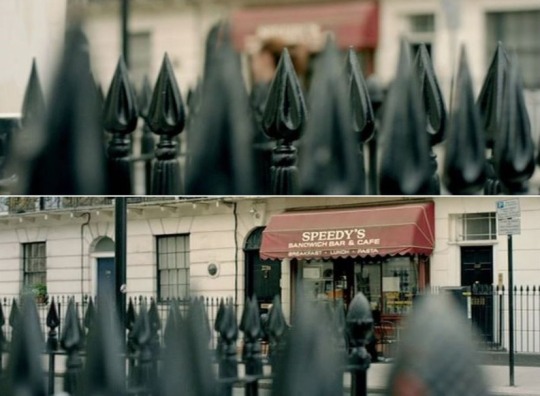
Three levels of spears stand like guardians in front of 221b Baker Street. Could those three levels symbolize the three stabbing victims of The Sign of Three? After all, each one of the three characters is depicted as guard, as protector ... and each one of them gets stabbed.
TBC below the cut ...

Stephen Bainbridge
He is a Private in the Household Guard of the Queen. The Grenadier Guards is an infantry regiment of the British Army. The current regiment is known as the 1st Regiment of Foot Guards … ’Every foot soldier bears the mark’ (Soo Lin, TBB). How surprising is it that the ‘East’ zooms in on Bainbridge before he gets stabbed by Jonathan Small?
Also … the gesture of the woman is interesting. Two Vs make a W (or a M … depends on the turning). It also lets me think of Culverton Smith’s W-gesture in TLD, in the short clip with the man disguised as cock (x).

Modern Grenadier Guardsmen wear a cap badge of a "grenade fired proper" with seventeen flames (x). Foot soldiers linked to exploding grenades … what a lovely coincidence, especially regarding the ‘passions’ grenade from TFP. :)

When the changing of the guards takes place, Bainbridge is already wounded and slowly dying. He got stabbed before the changing.
The name Stephen is of Greek origin and means ‘crown’ and ‘that which surrounds’. Saint Stephen was stoned to death and is regarded as the very first Christian martyr.
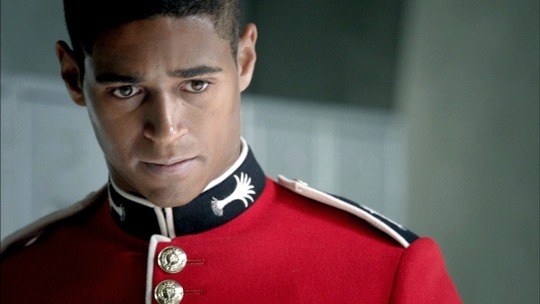
Another little detail caught my attention as well. Just a word used twice to describe a person.
SHERLOCK: “Elite Guard.” JOHN: Forty enlisted men and officers. SHERLOCK: Why this particular Grenadier? Curious.
And in TRF Sherlock sais:
SHERLOCK: This little boy; this particular little boy ... who reads all of those spy books. What would he do? JOHN: He’d leave a sign?
Max Bruhl left a sign. Stephen Bainbridge wrote a note. Not much of a difference, I think.
Guardsmen Max and Claudette
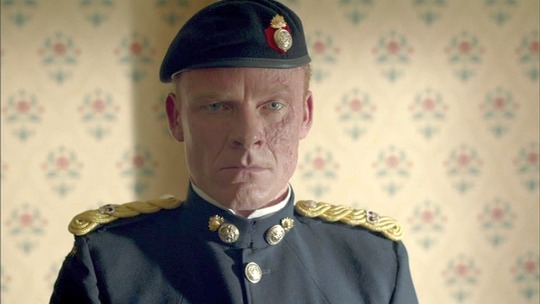
James Sholto
He is a retired Major of the Fifth Northumberland Fusiliers and Captain John Watson’s old commanding officer. A decorated war hero but not to everyone. Something went wrong when he led a team of new recruits into battle. ‘They all died’ (just like AGRA). Major Sholto, badly wounded, was the only survivor. Press and families gave him hell. Deaththreats and hate almost turned him into a recluse, into a most unsociable man, who spends his retirement way out in the middle of nowhere.
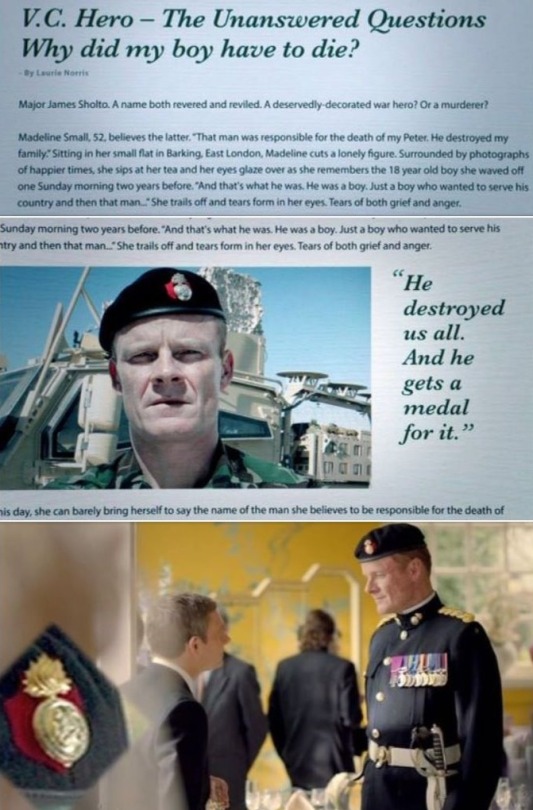
I’m quite sure this has been mentioned before, the 5th Northumberland Regiment on Foot (’foot soldiers’ too) still uses their ancient badge … St George killing the dragon (x) Every quiver of his beating heart
‘He destroyed us all’ … somehow these words sound very similar to the one Sherlock uses in TFP, in a situation where he considers himself to be a soldier: ‘Five minutes. It took her just five minutes to do all of this to us. Well, not on my watch.’
As mentioned above, Mary’s dialogue in TST matches the description about the incident with Sholto’s recruits almost identically … ‘something went wrong’/’but it went wrong’ … ‘I was the only one who made it our’/’they all died; he was the only survivor’. And Mary considered AGRA to be her family ... ‘we were family’.

Major John Sholto is an original character from ACDs novel The Sign of Four. His sons are called Thaddeus and Bartholomew. The renaming of the Major’s first name - from John to James - must have been a deliberate choice. A choice which is reflected in the skip code of TEH ‘John or James Watson … saint or sinner ... James or John’, as well as in John Watson’s middle name … Hamish (Scottish for James).
Major Sholto’s room number is ‘two oh seven’. This reminds me of the ‘double oh seven’ codeword for the ‘flight of the dead’ in ASIB. Two and double …. both means 2. Sure, the number on the door reads 207 but then, it happens several times in this story, that things told and things shown are sometimes not quite the same or vis versa.
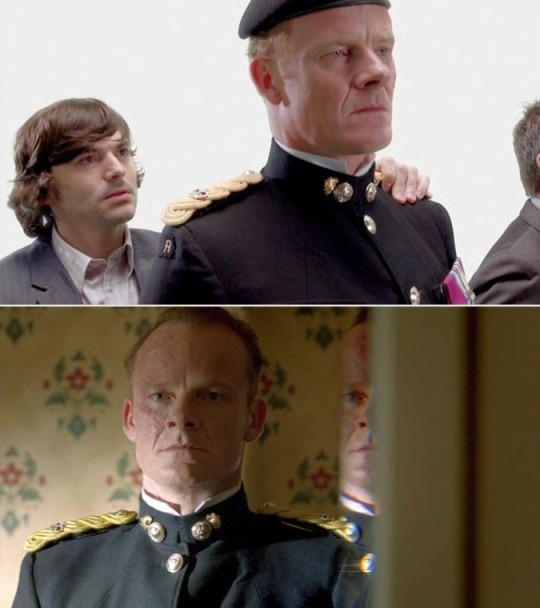
When the wedding guests leave the church and the reception takes place, Sholto is already wounded and slowly dying. He has been stabbed before.
Sherlock investigates the cases of both guardians
Bainbridge’s note reaches him sometime during the wedding preparations. John and Sherlock arrive just in time to save Private Bainbridge’s life. The case though remains unsolved.
Without knowing it at the time, Sherlock investigates Sholto’s case during John’s stag night. They call the investigation of the ghost-man the ‘Mayfly Man’ case. It remains also unsolved.
Sherlock includes both unsolved cases into his best man speech at John’s wedding and here at last, all the puzzle pieces fall into place and Sherlock is able to solve both cases, which are closely related. As a consequence Major Sholto’s life can be saved as well.
The person responsible for the attempts to kill Private Bainbridge and Major Sholto is:
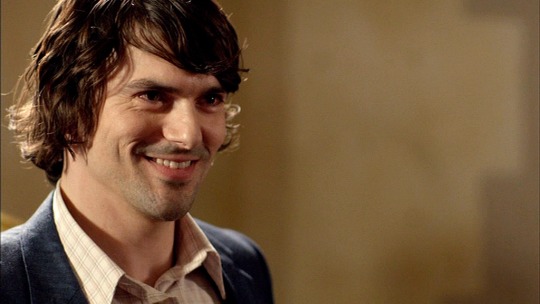
Jonathan Small
‘Brilliant, ruthless, almost certainly a monomaniac - though, in fairness, his photographs are actually quite good’ … that’s how Sherlock describes the killer. Small’s motive is revenge. He is convinced that Major Sholto is responsible for the death of Small’s brother Peter, who had been among the killed recruits. It seems that Private Bainbridge merely had the misfortune and got randomly chosen for the rehearsal of Sholto’s murder. But ... why this particular 'foot soldier’? (I’ll come back to that question later)
Jonathan Small grins like Jim Moriarty and wears a checkered shirt like John. He is a brilliant, ruthless monomaniac and obviously also a womaniizer who has no problems to woo half a dozen women, almost at the same time, into telling him well-kept secrets. Basically … a perfect blend of Jim Moriarty and traditional John ‘three continents’ Watson.
Like Major Sholto, Jonathan Small too is an original character from ACDs novel The Sign of Four. His name has not been changed. Only together with his female and not-canon counterpart Janine, Mary’s bridesmaid, who seems to be a lovely blend of Irene and Jim, the name chosen for the antagonist of this episode, appears to gain a special significance.
Janine - deiminutive of Jeanne, female form of John … ‘little Johnny’
Jonathan - diminutives are Jon, Jonni ... though not related to ‘John’ regarding the meaning of the name, it can still be heard as … ‘little Jonny’ (’You can talk, Johnny-boy. Go ahead.‘ Jim, TGG)
None other than ‘little Jo(h)nny’ (the H makes the difference) is responsible for the almost murder of Private Bainbridge and Major Sholto, the first two stabbing victims of this episode.
‘Little Johnny’ also happens to be another word for penis … the ‘meat dagger’.
Who’s the third ‘victim’ then?

Mary Elizabeth Morstan
She is a character full of surprises who starts as a simple nurse who marries John Watson in TSOT. Among Sherlock’s deduction-word-cloud in TEH the term ‘guardian’ can be found and only one episode after the ‘wedding’, Sherlock outs her as facade … his very own facade, because the Empty Houses in Leinster Gardens, on whose front walls Mary’s face is projected, are Sherlock’s property.
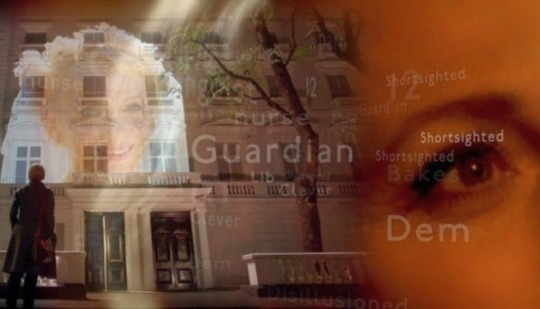
Mary Elizabeth Morstan isn’t her real name either. It’s the name of a stillborn child from a gravestone in Chiswick Cementry. This connects her character to the other stillborn child of this story ... Rachel Wilson, the pink lady’s daughter from ASIP. The initials A.G.R.A. stand for Mary’s true name, she tells later … but soon this turns out to be incorrect as well. A.G.R.A. was a group of four undercover agents who worked for the British Government. Prior to her ‘retirement’ Mary had been a member of that group. Sherlock describes her as ‘super-agent with a terrifying skill set’. Based on the current status, her two first names are Rosamund Mary … the family name is still unknown (if there even is one).
Why should Mary be the third stabbing victim?
Readers of my theories will probably know that I’m playing for a long time now with a mind palace scenario which stretches from the beginning, most likely in PILOT (or even before) to the end of S4 (x). Back then I wondered ...
Is it really so farfetched to consider the possibility that Sherlock tries to deduce and solve the mysteries and problems of his own live - and his falling in love with John - at first in his mind? Before he comes out?
Over decades - since ACD - the story of Sherlock Holmes and Dr. Watson has been told by the famous 'unreliable narrator’. Could it be that this time - with Sherlock BBC - the world will get the true story? Finally told by Sherlock himself? By looking right into his heart and mind and soul? By showing how his brilliant mind works? How his heart and soul expand and grow?
Would TPTB do such a thing? Stay in Sherlock’s mind over the span of multiple episodes? Follow his train of thought … show his evolution … in such a way? I don’t know. But it sounds thrilling to me. (Nov 2016)
Based on those early ideas I gradually came to the conclusion that Sherlock BBC tells the story of how Sherlock Holmes deduced his own persona. He does this the same way he investigates his criminal cases … by setting up scenarios in his mind and repeating those until he has found the correct solution (The Stage is set). Investigating his own case - the pink one - in such a way, would mean that all the characters which appear on Sherlock’s ‘mind stage’ represent different aspects of himself. Some of them may be based on real life persons, most of them are probably entirely created by Sherlock’s imagination. I like to compaire this process to a ‘mind journey’ or to a long (dramatic) dialogue, Sherlock holds with himself. This propably doesn’t happen during a dream or in a state of coma, as I thought back in 2016. A lot of time and thinking has gone by since then. Nowadays I presume that a conscious thinking process would fit better with the literal character Sherlock Holmes, whose deductions are always built on facts, science, reason and logic. It would be rather OOC that a man like Holmes would base an important, life changing decision on anything else than his razor sharp mind. Anyway, it’s just one of many theories.
Mary now … ever since I noticed the lot of similarities this character shares with Sherlock (x) my view on her started to change considerably. To me she isn’t the woman anymore who comes between Sherlock and John but instead the facade Sherlock Holmes created and married to his traditional, eternal friendship with John Watson for the sole purpose, to hide his romantic feelings and his sexual desire for the friend behind this protective wall. Mary is Sherlock’s facade, his guardian, his firewall … because:
John can’t ever know that I lied to him. It would break him and I would lose him forever – and I will never let that happen. Please … understand. There is nothing in this world that I would not do to stop that happening.
In my opinion, these are Sherlock’s own words and they express his fear of what might happen to the uinque friendship he shares with John, if the friend ever discovers the true nature of his feelings for him. Sherlock would do anything to stop that happening, even if this means that he has to incarcerate his emotions inside a high-security facility, behind elephant glass and chain his sexuality with iron bonds to a wall in a padded cell, like a hound from hell.
The ‘meat dagger’ incident
Sherlock tells the wedding guests - Major Sholto sits among them - about the unsolved Bainbridge case and asks if any of them has got a theory how that guard might have been stabbed. What kind of murderer can walk through walls, which weapon can vanish? Molly’s fiancé Tom (both characters are mirrors for John and Sherlock) assumes it could be a case of ‘attempted suicice by meat dagger’ ... something that would have been self administered.
A lot has been written since then about the ‘meat dagger’ as a metaphor for 'penis’ …. for ‘little Johnny’. :)

Sherlock sees only one feature of interest in the whole case … while he tried to solve the mystery, the eternal friend saved the life of the guard. And just the same happens a little while later with Major Sholto, the other guardian. It turns out that both men - both guardians - have been stabbed by the same killer … Jonathan Small … little Jonny, the meat dagger ....
There’s only one other character in this episode who has been stabbed unknowingly as well. That’s Mary. And in her case it’s indeed … ‘stabbed by meat dagger’ because Sherlock deduces her pregnancy by the end of the episode. Or expressed in computer language: the firewall has been penetrated by the virus.
The ‘father’ might be John or David, Mary’s ex. It doesn’t matter if one views the story metaphorically where all characters represent aspects of Sherlock himself. Going by his looks, David is clearly a mirror for John, while his history regarding the constant online observation of Mary, connects him to Mycroft, the brain. David seems to be a ‘blended’ mirror like Jonathan Small (John/Jim) or Janine (Irene/Jim). A mirror who represents the ongoing interest of the brain in the feelings hidden behind the facade.
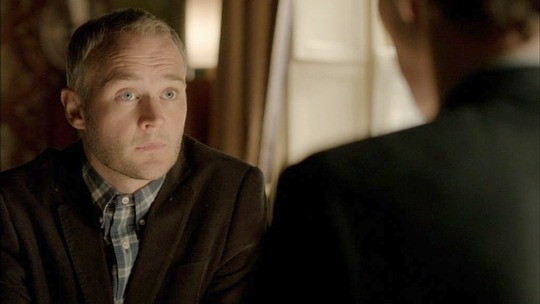
When Sherlock marries John and Mary, he puts a guardian in front of his true feelings for the friend. He tries to ‘downgrade’ those feelings. And yet, Sherlock allows three ‘social ancounters a year’ but ‘always in John’s - the traditional friendship’s presence’. That sounds very much like the ‘calculated risk’ Mycroft takes with Eurus. Both ‘brothers’ seem to be ‘love-addicts’ in need of a fix, once in a while … when the burden of ‘holding oneself to a higher standard’, of ‘keeping oneself right’ gets too heavy … or too boring. In that case it could propably happen that one takes the frustration out on the wall … then the wall has it coming … :)
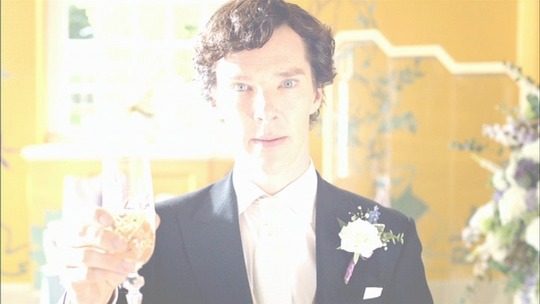
The moment of revelation
When Sherlock is blinded by the flashlight of ‘little Jo(h)nni’s’ camera, he suddenly realizes that the cases of Bainbridge and Sholto are connected. That the stabber has to be the same person. It’s the moment when the first domino piece falls and knocks over the next, and the next, and the next …. leading to a chain reaction of revelations at the end of which Sherlock knows without any doubt that his new facade had been penetrated again … this time though by a ‘kill shot’. He’d been hit by AMO (the perfect ammonition), fired by the crack shot that is his eternal friend. The seed of love has been laid without Sherlock noticing the ‘chink in his armour’ through which Cupid’s arrow hit home. Now love has taken root behind his facade and is growing.

The name chosen for that love is Rosamund - Rose of the world, as the dialogue in TST confirms. There’s a real rose of that name - Rosa Mundi - an old rose depicted in a work of Sandro Botticelli “Virgin Adoring the Sleeping Christ Child”. This rose is also known by the synonym ‘rosa versicolor’ - which means ‘rose of many or changing colours ... iridiscent’.
The word iridescence is derived in part from the Greek word ἶρις îris , meaning rainbow, It is the phenomenon of certain surfaces that appear to gradually change color as the angle of view or the angle of illumination changes. (X)
Sherlock - the ‘virgin’ he is called in ASIB by Jim and Irene - announces the pregnancy of Mary (I still wonder if this means that he is the 'Gabriel’ of A.G.R.A. - the angel who announces virgin Mary’s pregnancy). And during the stag night, John is labeled with ‘Madonna’. Another name for Virgin Mary. This turns the eternal friend also into the ‘virgin’, just like Sherlock and Mary. Another ‘sign of three’ one could say.
Three virgins - three novices - who will now start a new journey on a way they have never travelled before. Sherlock will finally encounter romantic love and accept it ‘it is what it is’, the facade will ‘get retired in a pretty permanent sort of way’ as the brain blatantly puts it in TST and the traditional ‘eternal’ friendship will have to change into a romantic-sexuell relationship. A morphing together of friendship and sex - John and James - would be a quite logical consequence, I guess.
In TST the little baby is christened with the name Rosamund, a name that can be traced back to ‘rainbow’ … Rosie for short. And rosy=pink!
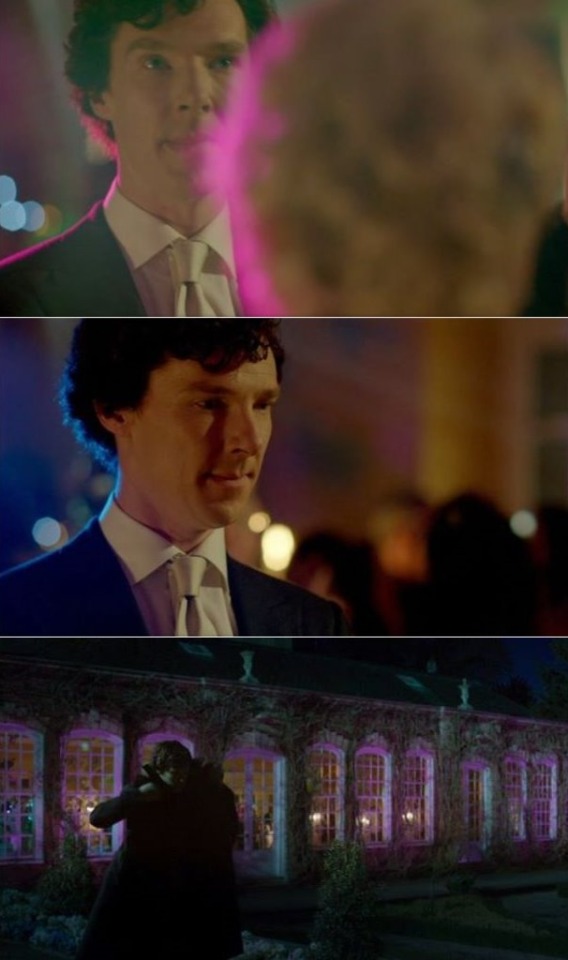
‘Oh, what a night! ... I was never gonna be the same … I felt a rush like a rollin' ball of thunder spinnin' my head around n' takin' my body under’
No wonder this song has been chosen by the creators to accompany this scene. Overwhelmed by emotions - surprise, confusion, amazement, shock, joy, panic, uncertainty, concern, fear - Sherlock isn’t able anymore to carry on with this ‘wedding’ .... with this renewed ‘changing of the guard’. He walks away alone into the night. The case is solved. Sherlock is aware of what happened. Now he has to deal with the consequences. Should he really replace his guardian again or should he finally stop pretending, stop lying, drop the facade and confess his deepest secret?
Because if you tell them and they decide they’d rather not know, you can’t take it back. You can’t unsay it. Once you’ve opened your heart, you can’t close it again.
This confrontation, Sherlock fights with himself, becomes the centrepiece of the following episode (HLV) where Sherlock is completely torn into. One half of his being, still protected by the facade, is at war with the ... ‘other one’, the slowly increasing emotional side of him. But somewhere deep inside his mind he probably knows already that this is a war ‘he must lose’. And so Sherlock has to go deeper ...
TAB doesn’t only take Sherlock back to his literal roots. In this episode Sherlock investigates again two of the main threads of the story and ties them together through the ‘bride’ … FALL and HOUND. Mary, the facade, feels already ‘left behind’ and John, who represents Sherlock’s now fully acknowledged, tender feelings, directed at his friend ... ‘does grow up so fast’. The episode ends with Sherlock, who throws himself into a torrent of water=emotions and follows Jim Moriarty, Mr Sex, down the Reichenbach Fall … right into the emotional rollercoaster that is Series Four.
Like the investigation in TAB, this series runs backwards as well. TST repeats the events of S2 and S3 while TLD zooms in on S1. I persume this happens because Sherlock applies an ability he describes to Dr. Watson as ... ‘reasoning backwards’:
“In solving a problem of this sort, the grand thing is to be able to reason backwards. That is a very useful accomplishment, and a very easy one, but people do not practise it much. In the every-day affairs of life it is more useful to reason forwards, and so the other comes to be neglected. There are fifty who can reason synthetically for one who can reason analytically…Let me see if I can make it clearer. Most people, if you describe a train of events to them, will tell you what the result would be. They can put those events together in their minds, and argue from them that something will come to pass. There are few people, however, who, if you told them a result, would be able to evolve from their own inner consciousness what the steps were which led up to that result. This power is what I mean when I talk of reasoning backwards, or analytically.” (ACD A Study in Scarlet, Conclusion)
There’s one important change though, which will alter everything. Sherlock now adds baby Rosie, the pink seed of love, the AMO-factor, to his equation. As a consequence his mask, his facade - that what ‘thatched’ and guarded him - crumbles and falls. And Sherlock accepts the change … It is what it is.
Then, in TFP, the third episode of S4, Sherlock puts the results of his deductions under the sharp lens of his emotional core, for the ultimate experiment … the final distillation … to produce at last a clear solution. Still missing is the chemical reaction that should follow the application of that solution, one might say. :)
Back to the three ‘guardians’
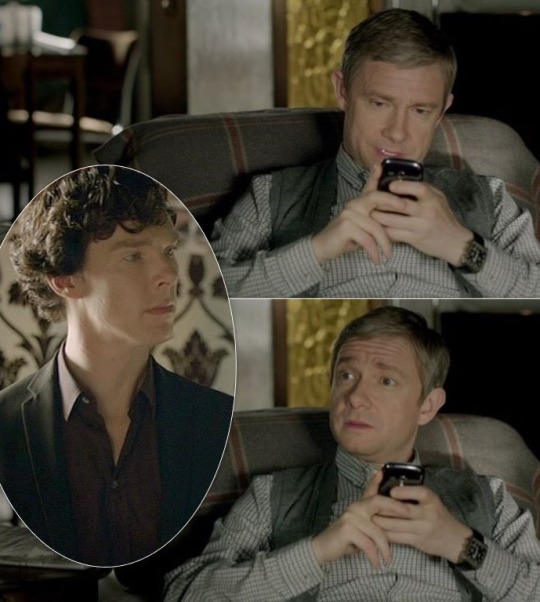
My husband is three people
During the wedding preparations, John tries to interst Sherlock for this curious case. John says the sentence ‘my husband is three people’ twice, interupted only by this short dialogue:
SHERLOCK: Major James Sholto. Who he? MARY: Oh, John’s old commanding officer.
Taking John’s words ‘my husband is three people’ literally, then he is talking about his own husband … which will soon be Mary. Husband, not wife, because Mary represents an aspect of Sherlock, his facade, his cover ... his ‘thatch’. As mentioned above, when Sherlock marries John to Mary, he puts a guardian in front of his true feelings for the friend … one could also say …. he places a commander at their/his side. And this is exactly what Mary does in later episodes. She decides who mowes the lawn, chooses the name of the baby and that it is her to take John home and not vis versa.
Husbands can be equated with facades, with commanders, with guards. All of them serve as protectors and defenders of Sherlock’s true feelings for the friend.
Who could have been the first ‘husband’ … the first facade, the first guardian?
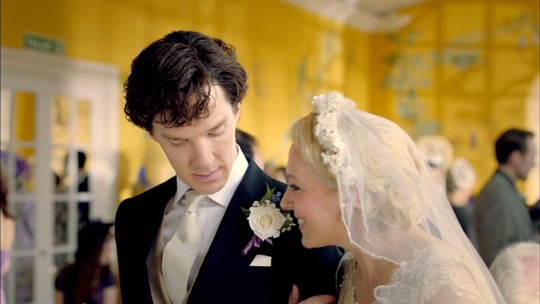
Neither of us were the first
This is what Mary tells Sherlock, while John welcomes his ‘privious’ commander. Is she really talking about sexuell experiences of her brand-new husband with another man, just to taunt Sherlock? Viewing the Mary-character as an aspect of Sherlock himself and not as a real wife that comes between two men, I heavily doubt this. Applying a metaphorical reading to the story, wouldn’t it be much more likely that this conversation is about their - Mary’s and Sholto’s - assigned profession. Neither of us were the first … guardian.
Mary is the husband to be, the most recently chosen facade, John’s new commanding officer, an undercover agent of the government.
Major James Sholto is John’s old commanding officer, Sherlock’s previous facade, which turned out to be not strong enough.
The only other guard in this story is Stephen Bainbridge, Private in the Household Guard of the Queen. The foot soldier named after Saint Stephen, the first martyrer.
And isn’t there somthing strikingly similar regarding those three guards as well as a noticeable increase in drama and strength, which so often happens when sequences are repeated on Sherlock’s mind stage?
Private Bainbridge guards the Queens Palace. The ‘East’ zoomes in on him, then he get’s stabbed by ‘little Jonny’ - the meat dagger - without noticing it. A changing of the guard takes place. Bainbridge almost dies beneath a shower of water.
Major Sholto guards the Queens country. He fights on a battlefield in the East beneath a burning hot sun. Something goes wrong and all the recruits under his command die. Badly wounded himself, Sholto has to leave the service and change into retirement. He gets stabbed by ‘little Jonny’ - the meat dagger - and almost dies.
Mary secretly works for Mycroft, the government, the ‘queen’ - as an undercover ‘super-agent with a terrifying skill set’. Her last operation took place in the East. Something went wrong and a lot of people died. It first looked as if Mary had been the only surviver (like Sholto). She marries ‘Johnny-boy’ Watson, gets stabbed by his meat dagger, becomes pregnant and …. dies not long after ‘PINK-RAINBOW-ROSIES’ birth.
The Sign of Three is about the ‘changing of the guard’. It takes place inside Sherlock’s head. But the marriage of John and Mary, that Sherlock arranges so heartbreakingly beautiful (and so strikingly yellow), turns out to be utterly pointless. Because the bride, the husband, the new commander, the facade is already pregnant ... had been stabbed before the wedding ... before the changing of the guard.
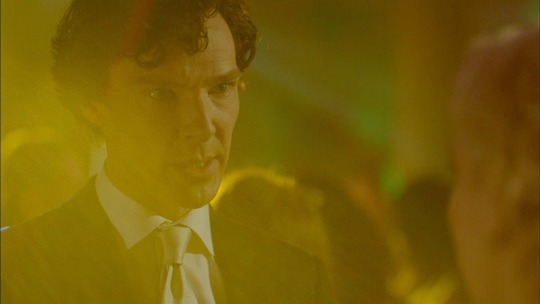
The Yellow Face connection
This isn’t new. It has been discussed before in this interesting meta About Yellow Face by @darlingtonsubstitution (sadly the part below the cut is gone) from 2017. As mentioned in the comments there, the creators of Sherlock BBC once refered to their favourite ACD stories. Yellow Face was among them but ... they wouldn’t be able to adapt it, because of the sensitive content, they said. This isn’t quite true though, it seems. On the contrary, the colour yellow features most prominently in Sherlock BBC … and not just the colour itself.
It starts with Sherlock’s and John’s first date at Angelo’s. The whole scene is drenched in yellow. PILOT even more than ASIP.
A secret code of ancient cyphers, sprayed in yellow paint, leads to the Yellow Dragon Circus.
Golden cats and big ‘yellow’ felines - lions - roam the story.
Yellow is the colour of the smiley face on the wall of the 221b living room.
There’s an assassin who carries a yellow ladder and a yellow tool case with a gun in it.
A bright yellow mask has been placed inside a box, alongside a train, a phone, nicotin patches and a note.
The main colour of the wedding ... bright yellow. It’s the wedding that leads Sherlock to the revelation ... to his love deduction.
A canary trainer, a trainer of yellow birds, turns out to be the killer.
Norbury, the case of the Yellow Face from canon, plays a vital role in TST
The finish of a race is marked with a bright yellow band that floats slowly to the ground while a ‘confessing’ serial killer, who is a mirror for John, passes as winner, signaling a W with his fingers, while the fingers from the ‘East’,, next to Private Bainbridge, signal a double V.
Yellow is the colour of the sun, of fire, flames and explosions.
Yellowbeard ….
But one of the most important links to Yellow Face is the following one:
JOHN: Mary, I may not be a very good man, but I think I’m a bit better than you give me credit for, most of the time. (Sherlock BBC, TST) 'I am not a very good man, Effie, but I think that I am a better one than you have given me credit for being.' (Grant Munro, The Adventure of the Yellow Face)
This piece of dialogue connects John to Grant Munro, the husband of Effie, the woman who hides her secret child from a previous marriage behind a yellow mask. She doesn’t do it out of some dark or sinister motive as Sherlock Holmes is convinced at first. Her former marriage had been legal and she'd loved her late husband dearly. Lucy, her little girl, can truly be called a child of love. But Effie fears to reveal Lucy, because the girl is ‘different' and the mother is anxious to lose the man she loves now, because of this. She is torn into between the love for her child and the love for her husband.
She (Effie) drew a large silver locket from her bosom. 'You have never seen this open.'
'I understood that it did not open.'
She touched a spring, and the front hinged back. There was a portrait within of a man, strikingly handsome and intelligent, but bearing unmistakable signs upon his features of his African descent. (ACD, The Yellow Face)
ACDs Yellow Face is a case without crime, without any devious betrayal. Instead, it’s about love and the fear to lose love, because at that time in ACDs story, it’s about a love not accepted by many.
'That is John Hebron, of Atlanta,' said the Lady (Effie), 'and a nobler man never walked the earth. I cut myself off from my race in order to wed him; but never once while he lived did I for one instant regret it. It was our misfortune that our only child took after his people rather than mine. (ACD, The Yellow Face)
In ACDs Yellow Face, the ‘first husband’ is of ‘African descent’ … just like Private Bainbridge, who is the ‘first guardian’ - the first of the three ‘identical husbands’ - in Sherlock BBC, The Sign of Three. He is the one who represents Sherlock’s earliest facade … the guardian of the Queen’s Palace.

Just like @darlingtonsubstitution presumed more than two years ago, I’m now more convinced than ever, that Moffat and Gatiss did adapt ACDs Yellow Face and they not only included it in Sherlock BBC, they made it into the main theme of their story (beside ‘hound’, ‘fall’ and ‘scarlet/pink’). In their version though, the focus shifts from ‘unacceptable’ skin-colour to ‘unacceptable’ sexuality.
Sherlock BBCs baby ... Rosie ... Sherlock’s baby ... represents love. And this love is pink and has been given a name that can be traced back to ‘Rainbow’. The Sign of Three tells the story of the ‘changing of the guards’ and how Sherlock finally discovers the AMO-factor that will alter his life completely.
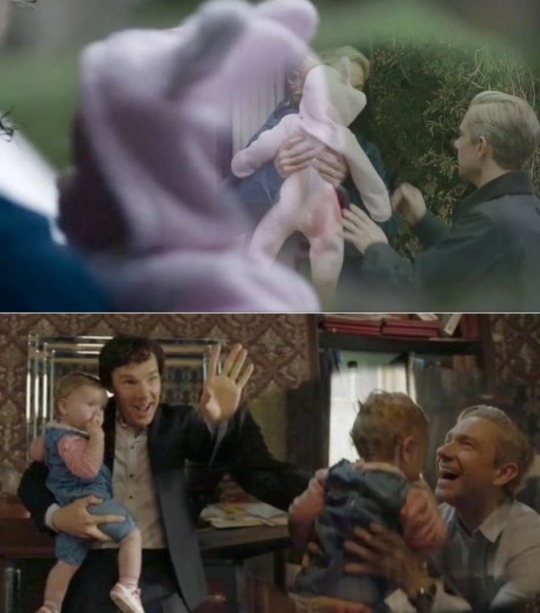
When I discoverd Sherlock BBC for the first time (back in 2011) I was thrilled by that fascinating crime drama and its two charismatic leads. Now, after 13 episodes, it has grown into so much more than just an excellent crime drama among others. The way I read it, Sherlock BBC is a wonderful and stunning story about equality. Inside Sherlock’s mind, the great detective doesn’t only solve the greatest secret of his life. No, the actors Sherlock chooses to represent the different aspects of his persona, are as diverse as the colours of the rainbow. They are old and young, male and female, beautiful and ugly, strong and weak, rich and poor. Neither gender, sexuality nor the shade of skin colour or from which corner on this planet someone comes, is of any importance. Anyone can be a part of this Sherlock Holmes. That’s what makes this adaptation so absolutely unique to me. Sherlock himself becomes the rainbow of his own story.
Thanks for reading to anyone who is still there. :)))) I leave you to your own deductions. And thanks @callie-ariane for your invaluable scripts.
December, 2019
________________________________________________________________
Episode spanning metaphorical reading of Sherlock BBC:
From PILOT to TGG …. About the meaning of S1
From ASIB to TEH …. The big question - what is the meaning of Reichenbach
#changing of the guard#sherlock bbc#metaphorical reading#the sign of three#guardians#commanders#husbands#edited pics
61 notes
·
View notes
Text
THE SEVEN-PER-CENT SOLUTION
In the collective imagination Holmes wears a deerstalker (not true), wears a cape (maybe), uses a magnifying glass (often), smokes a pipe (very willingly), is a heartless machine (only at a first glance ) and is a drug addict.
His habit of drugs, consolidated in the Canon, often, probably in order not to offend current morals, has been neglected by subsequent adaptations that have become fossilized on stereotyped and even not completely true characteristics.
The attitude towards drugs has changed over the past 130 years, to tell the truth, it has also changed during the course of the Canon itself. Sherlock Holmes will stop his vicious habit at some point.
You can’t even blame Doyle for having started it, substances such as morphine and coacaine, recently synthesized (1803 morphine, 1855 cocaine) were used in the medical field, were also given to children, and for voluptuous purposes. The same heroine, the last born, sees the light in the pharmaceutical field in the Bayer company. Toning drinks whith cocaine were common, the same CocaCola contained it in its first formulation. Cocaine was above all much appreciated by intellectual circles as it gave the feeling of being able to open the mind and stimulate mental processes. No wonder if a man like Sherlock Holmes may have wanted to linger in such a vice.
However, the negative effects of drug intake were gradually more evident. A doctor like Doyle couldn’t ignore the course of events and Watson's position on drugs became rigid, even Holmes himself gave up on this practice (MISS).
The use of drugs wasn’t seen as pathological, a traumatic cause wasn’t sought in the habit of indulging. So wanting to see something more behind Holmes's addiction could just be, perhaps, a distortion by what we know and feel now. However, even in the Canon the use of drugs is associated with a sense of abandonment and the consequent search for comfort (SIGN).
This is one of those rare glimpses in which the mask of Holmes slips and he appears as a sensitive man. Ignoring his habit takes away a chance to make the detective a creature less chilly and more human, imperfect. No wonder then that the two adaptations that for first tried to see Sherlock Holmes as the human being behind the detective didn’t leave out this habit and tried to suggest that there was something more behind it. I'm talking about The private life of Sherlock Holmes and The Seven-Percent Solution. But both adaptations, I must say, make promises they don’t maintain. We don’t know much more about Sherlock Holmes' private life after seeing the film (I have not read the book), it is suggested that between him and Watson there is more than a friendship, or at least that Holmes would like more, but then they missed tyself in a maze of international plots, fatal woman and submarine. But The Seven- Percent Solution is perhaps, in my opinion, even a greater disappointment.
Spoilers under the cut.
The assumptions are excellent, brings together Holmes' drug habit, which appears much more obvious and out of control, and Sigmund Freud. A step not too bold. The alienist himself had suffered from cocaine addiction and had lost a friend for the same reason. So if at the beginning he had praised the virtues, using it for his patients, he had come to recognize the danger of it. It seems therefore possible , if not probable, a connection between the two minds. Fascinating meeting considering a similar approach to the method and a complete difference in the result. Freud uses to probe the inner world the same techniques that Holmes uses to navigate the surface and untangle the nodes of sensitive reality. The rational man meets the man who "invented" the unconscious and the reason for their encounter is cocaine. Potentially dynamite. But if attention is paid to detoxification, little is told, if not hastily and superficially (a few lines) of the reason that may have prompted Holmes to indulge in a potentially deadly vice. In the book as in the movie attention is diverted by a case and if in the book it sees a woman at the center of a political intrigue that heralds the great war ( east wind), in the movie is further simplified and reduced to an operetta show, with barons, pasha, and a beautiful woman whom Holmes eventually falls in love with (sigh). In the book Watson shows a sincere affection for Holmes and Holmes despite his difficulties, is sensibly moved and obviously in need of his friend. There is Mary Morstan but, to the delight of the wary reader, she refers to Watson always (and many times, too many) calling him Jack. Particularly in a text in which Watson admits to having tampered with and falsified some of his work is a rather sugary detail. Watson saves Holmes' life by trickery, dragging him to Vienna to meet Freud. It doesn’t pass unnoticed, however, that the necessity of saving his life comes to light because Holmes' drug habit has considerably worsened since the doctor married. In the movie all this is less obvious, between the two it is difficult to see a real bond. Holmes seems, throughout the movie, a thinking machine (in the grip of delirium induced by cocaine, but still anaffective), we see he melt and soften only at the end while he smiles at the beautiful woman who they have decided to match to him (do you understand that I'm nervous?). Given that he has just turned away from Watson without any thought, on the part of both to be true, Watson seems more concerned about his readers who will remain without adventures, it is definitely annoying.
But I'm also annoying because I'm talking about all this without explaining the plot. Actually there are elements in the book, and partly also in the movie, terribly interesting from "our" point of view. I think one of the funniest elements of what we're doing here, is digging to find all those little details, steps, that, possibly, brought the Moffits to do what they did, how they did it. And I think this book / movie, like The Private Life of Sherlock Holmes, was a huge inspiration (maybe they even said it, I'm not good at keeping track of anything, even less interviews). And perhaps this character of incompleteness that combines the two works has been a stimulus.
The book opens with a preface by the author who pretends to have come in possession of a ( another) unpublished Watson’s script. A text dictated to a complacent typist when, at the end of his life, the doctor found himself alone, dead Holmes for ten years, in a nursing home (and here we can all cry crying in a corner). In the typescript Watson tells what really was behind the Final Problem. He also promises to tell the background to The Empty Houses, but unfortunately this is another promise he doesn’t keep. We are told that Holmes, left alone by Watson, has lost himself in an abyss of drug binges. A worried Mrs Hudson asks Watson for help, being afraid to enter Holmes' rooms, evidently prey of delirium. In the movie we can see him locked in home, room in an absolute disorder, nervously brandishing a gun in his hand. (say hello to Billy).

Apparently Holmes is totally obsessed with a certain Professor Moriarty, whose name Watson had heard only a few times and always when Holmes was high.
Holmes says that this gruesome individual is behind every crime perpetrated in recent years, the spider in the center of the web, the Napoleon of crime etc, etc.
Back home, Watson finds Moriarty in person waiting for him. He turns out to be a poor little man, former tutor of mathematics of the young Holmes. The man is worried because Holmes pursues him, following him physically and threatening him by letter. He admits at the same time of being attached to the two Holmes, that his time in their home was pleasant, until the moment of the tragedy. However, he refuses to elaborate the subject.
Watson then has proof that his friend is just about to lose his reason first, and his life then.
He find, the same day, thanks to the incomparable Stamford to which he had the good sense to ask for help, a newspaper article that talks about a certain Dr. Freud expert in disorders related to cocaine.
He therefore decides that at all costs he must induce Holmes to reach Vienna. Not being able to come up with a valid plan, he turns to Mycroft who has the "brilliant" idea of convincing Professor Moriarty to go to Vienna so that Sherlock is induced to follow him (it took a genius for a plan so elaborate ... .but again, we want things to be smarter than they are). Holmes in his ravings had thrown out of a vanilla extract in front of the professor's house, in this way he’s now able to chase, with the help of trusty Toby, the traces of Moriarty from London to Vienna ...
Once in the Austrian capital Holmes discovers the deception and is taken care of by Freud, who through hypnosis takes care to make him overcome the physical difficulties of addiction to cocaine. Holmes is obviously enraged with Watson who stoically endures all kinds of insults. Until the day when, to calm his friend, he hits him so hard that he loses his knowledge.
Once detoxed Holmes falls into a depressive state, from which he’s recover only thanks to his violin and a new case. Despite being in the house of Freud we never facing with the demon behind the vice, let alone the tragedy referred by Moriarty, that apparently never is mentioned.
The story then follows the development of the case, ending with a spectacular pursuit in a train. Pleasant, but seeing Freud used to shovel coal and not know anything about Holmes is a bit frustrating. In the movie is even worse, the case is silly, there is a ridiculous scene in which the three are attacked by a pack of dressage horses completely out of control (why, how!? ... maybe there is a Freudian allusion behind that I don’t want to investigate, or at least I hope) or another improbable in which the woman leaves as a trace to follow lilies from the very long stem. Holmes takes a while to notice the first, and a dumb Watson wonders if by accident they have accidentally escaped from the woman's hair. I'll not dwell on the scene in a brothel where Holmes continues to have to draw the attention of Watson who was drooling around with an imbecile expression.
At the end of both cases, Freud as a reward for the assistance provided, asks to hypnotize for the last time Holmes. Finally in this circumstance he ask about the famous tragedy that has disturbed Holmes' childhood by making that his future fixations was shaped on Professor Moriarty. It turns out that Holmes's mother had betrayed his father, which is why he ended to kill her and her lover. In the movie in a more simplistic, but also more direct, it is revealed that the mother's lover was none other than the tutor of the boys, Moriarty. In the book the path is more tortuous, Moriarty is guilty only of having told what had happened, to the young Sherlock. He becomes the scapegoat of his trauma, although he participated in a tangent way, probably in the absence of the real protagonists. This episode would also be the cause of Holmes's distrust of women.
This is another of those stereotypical characteristics that are given to Sherlock Holmes that although almost never expressing appreciation for the female gender, has at heart their health and happiness, in its own way, much more than most of the men who trample this land. He simply doesn’t love them, but this is not called misogyny, it's called homosexuality.
At the end of the story Holmes decides not to return to London with Watson, but to allow himself time to heal better. His intention is to earn a living with the violin under the false name of Sigerson. Perhaps even to deepen the knowledge of what it really is, but this is something that will happen,maybe, off the screen.
And maybe that's what the Moffits are trying to do is show what this book / movie, despite having courageous premises, didn’t know / wanted to do.
Meyer, the author, in fact, as a good Sherlockian, had, ably bringing forth the Great Game, putting together theories already circulated among Holmes fans.
The idea of child tragedy, of mother's betrayal, is taken by Trevor Hall who in 1969 theorized it in the Holmes-Ten Literary Study. Even the idea of paranoia from cocaine, which causes hallucinations on an innocent Professor Moriarty is taken elsewhere. Fred Musto in 1968 theorized that the figure of the criminal genius Moriarty was nothing more than a paranoid hallucination of Holmes while trying to detox himself (paranoia moriartii).
Moreover, the difference in "thickness" between the normal villains of Sherlock Holmes and the others of the Canon is so abysmal that no one can blame the man for thinking about it.
Extrapolating from TFP it seems even evident. (x)
"You have probably never heard of Professor Moriarty?" he said. "Never." "Aye, there's the genius and the wonder of the thing!" He cried. "The man pervades London, and no one has heard of him. "
Wanting to study the man behind the detective seems to me sensible to have been inspired by such premises.
Sherlock's dependence throughout the series is shown in an escalation that can’t be random. It starts from simple patches of nicotine, which could be the equivalent of cocaine used as medicine, to ended in real binges of drugs.
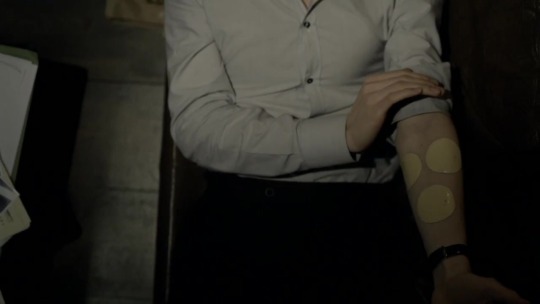

The hypothesis of a Sherlock who, in the grip of a delirium, an allegorical (x) delirium induced by drugs, perhaps so serious that it may have even left him in a coma, retraces moments of his life making to play to more or less innocent characters the part of villains seem to have deeper roots than they seem to appear.
Parts of the book and the movie seem already seen (or better, reviewed) in Sherlock.
From Mrs. Hudson asking John for help,

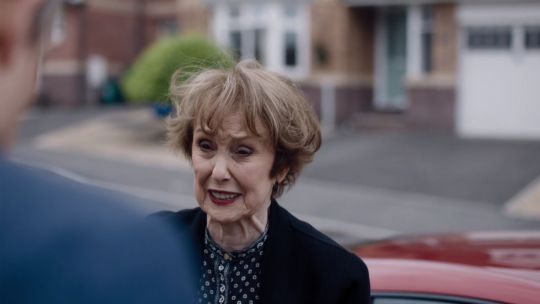
Sherlock closed in 221b in the grip of delirium whit a gun,


Moriarty who suddenly appears in the detective's thoughts, replacing something that already frightened him: the mastiff in THOB and in the movie when during one of the dreams in which Holmes falls prey during detoxification, Moriarty's face overlaps that of the SPEC snake.


Watson hits Holmes with more force than he wanted.

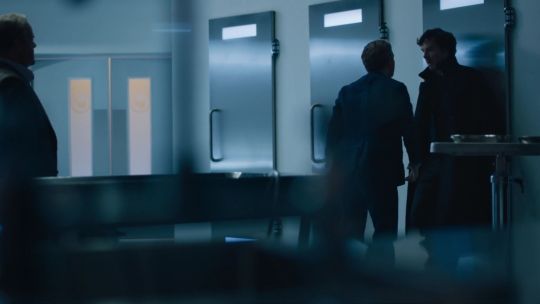
Another interesting idea is the scene in which, always during the detox, a ferocious mastiff leaves a closet.
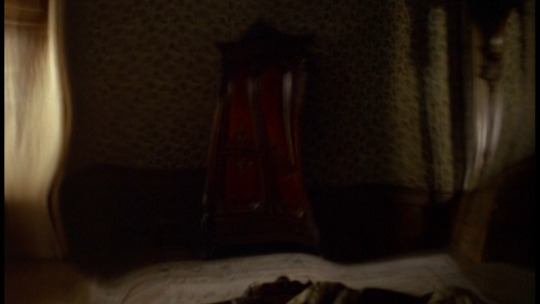

I don’t know if there may be any subtext here, even if I suspect that dogs were related to homosexuality in the Canon itself, but it is a cue from which the Moffits may have departed.
A curious case about dogs is also the choice of Toby's "interpreter". Dog not of breed both in the Canon and in the book, in the movie it has this aspect and is perhaps the living being towards which Holmes demonstrates greater affection.


Holmes the first time he finds himself in front of Freud accuses him of being just Moriarty disguised with a beard and a ridiculous operetta accent. Even in TFP we have someone disguised (this time for real) as a psychoanalyst and with a ridiculous operetta accent.
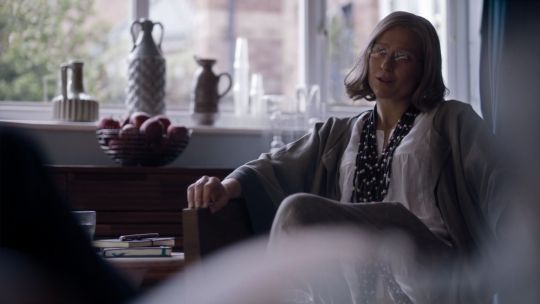
Another interesting fact is that Holmes speaks of Moriarty as the snake of Eden. Plausible considering that in the movie they make him the lover of the mother, but it is something that we also see in Sherlock.

So it's safe to ask who our Moriarty really could be. Too young to be the lover of the mother, or of the father if the clues collected by @sagestreet lead us to the right direction. Moreover here is the mother to become "incredibly monstrous". Mathematic genius is also the mother.
We know nothing about Moriarty, they do not give him any background. In Doyle we know his origins, his studies, his career and his profession. In Sherlock we only know from TFP that he has a brother of whom he has always been jealous and who was responsible for the death of Carl Powers. We only know that he is a criminal genius, not why or how he became like this. More or less the same things we know about Sherlock Holmes in the Canon.
@possiblyimbiassed @ebaeschnbliah @gosherlocked @sarahthecoat @sagestreet @loveismyrevolution
#the seven-per-cent solution#moffits background#sherlock addiction#holmes and freud#the man behind the detective
71 notes
·
View notes
Text
I’m gonna illustrate to you the Thanos-problem not so quickly.
The studio went to Kenneth Branagh in 2010 and told them they want a villain as good as Magneto for their Avengers film.
And almost 10 years later the MCU wanted to write an interesting, political villain called Thanos for Infinity War/Endgame.
Now, when Kenneth Branagh got the (really annoying) custom-order for a good villain, he didn’t look at the villain the studio liked and copied him. Instead he had the brains to write Loki as a character. With his own personality traits, qualities, quirks, a unique backstory that appeals to Branagh’s strength as a writer, whose origin story can be used and re-used in future films and plots, who has unique and adaptable strengths and weaknesses and who is played by an actor who is really good at playing roles like that.
Meanwhile Thanos is just...going through the Killmonger/Loki/Magneto motions of: political villain: ✅ tragic backstory: ✅ destruction: ✅ big baddie speech ✅ --- but there is no heart to any of that, no sense of detail, no moment for him to shine no personality.
And you know (I really tried to stop myself from adding this) in the 90s we had this flood of dark, gritty anti-heroes with their giant guns and ten thousand pouches. And some of them like Cable were really good while later characters became pale imitations of Cable (think of that famous video of Liefeld inventing a character and he just draws Cable number 8948320 and his backstory is that he’s a cyborg) and all those rehashes of the Killing Joke. And in the end they all lost track of what made these characters good in the first place.
And in the late 2000s and early 2010s we had this wave of young, hip, funny for the lulzs supervillains who just had quirks and no reasons and personality and in the end, basically nothing of substance remains of any of them - an epidemic starting with Heath Ledger’s Joker but were later replaced with young men in suits who were also kinda pop-culturally - ironically Leto’s Joker hopped onto that bandwagon like 9 years late with a starbucks
And I understand why in the last few years, political villains have entered mass-production, but a villain like that doesn’t work unless your writing challenges their ideas. Okay lemme give you another example: Since the (in)famous Far Cry 3 with its very 2012 villain quirky-crazy-Joker-y villain Vaas we now had Far Cry 4 playing in the land of a slightly quirky fashionable young man dictator and Far Cry 5 and New Dawn with an evil Christian cult right in the US.
The transition from early 2010s to late 2010s is obvious but - these are video games and by the time we fight the final boss, we have automatically actually spent a lot of time in their respective worlds. We know why these are horrible people. We are challenging their methods and ideas already when we encounter them. In the MCU, we see Killmonger actually rule over Wakanda and we know while his ideas are good. his methods aren’t - while at the same he challenges Wakanda and forces T’Challa to accept that his father was not perfect. Each time we see Loki rule over Asgard, imperialism is challenged - in the first time when he actually attacks Jötunheim (thus executing exactly the things he had been taught his entire life) and by not intervening in the colonies in Ragnarök. But, you are going to say, Thanos ideas are challenged! We see that people are sad that he killed half the universe! - and I mean yeah, but I didn’t need to watch the movie to know that people would be sad. Instead, everything happens exactly as you expect it would. All these previous examples were interesting because we wouldn’t know what the villains would do and how it would affect the population. Also the final notion - that the universe would eventually be better of if half the universe was destroyed, remains unshaken and unaddressed.
And honestly, their attempt to make Thanos likeable or understandable might be the huge problem of the film. Thanos as a morbid, unlikable killer who’s in love with death works because we don’t need to relate to him for that. We don’t need a connection. Many good villains are absolutely detestable. You can do a lot not by making them seem sympathetic (which is almost impossible with villains like Thanos anyway) but you can make them interesting to the audience-
let’s talk about villains who are absolute giant assholes but I like them:
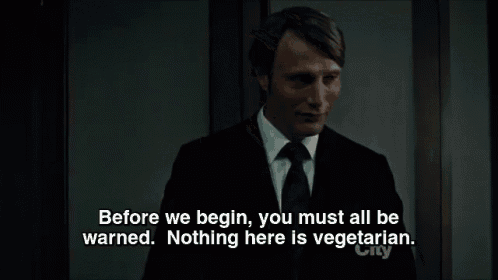
Yeah him <3 You remember the first season of Hannibal? As members of the audience, we know who Hannibal is before we even start watching. Hannibal Lecter is one of the most famous villains there are. In the movies, he’s arrested in Red Dragon right in the first scene - there is never any doubt about who he is. But in the show, he’s yet an active serial killer and working with the police. The police that solves his murders. The police who doesn’t know that he’s the killer. The killer whose name literally rhymes with cannibal and who makes cannibalism puns. There were hundreds of memes about how fucking frustrating it was that the police always just walked right past him.
That was the thing: We, the audience, knew something the characters didn’t. Like in a horror film when we know the killer is hiding behind the door and the main character doesn’t. You want to fucking scream at the screen in frustration. Okay what does that have to do with Thanos? Imagine all those glimpses and we saw of him in previous movies would have presented him in a likeable light. Imagine if his disciples were actually seen gaining people’s trust or if people in GotG would actually casually mention “oh Thanos will fix this, I heard he has a brilliant plan” or he tried to convince them that there was a huge famine coming. It would have been so frustrating to see people trust him because obviously everyone who reads the comics would know that Thanos is bad news and if we saw people actually trust him? maybe actually give him Infinity Stones to fix the universe because he’s the only one who can use them? Fucking rude.
Reveals :)
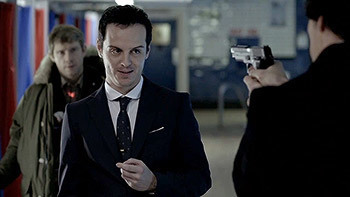
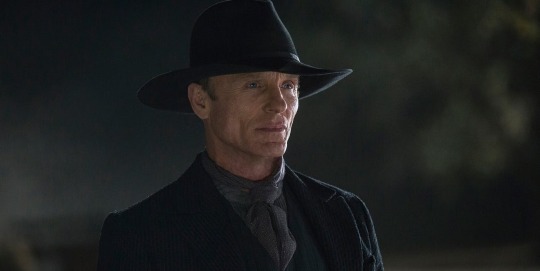
I guess I don’t have to tell tumblr who the first guy is but a quick rehash: In season finale of Sherlock, a guy who appears in one scene as the girlfriend of a colleague of Sherlock turns out to be Moriarty.
And guess what? It absolutely doesn’t matter one single fucking bit that Moriarty is the lab guy. And the big reveal doesn’t matter because we’re not given any of the clues. He might as well have been the mailman. Now, the Man In Black from Westworld however? That was a huge reveal. (Major spoilers if you haven’t watched it but I’m keeping it vague). We saw the Man In Black commit the worst crimes imaginable throughout the first season of the show, he killed hundreds of people without remorse. And in his defence, we thought that he thought it was all a robot theme park. Except? We find out that he’s actually the older version of one of the main-characters who absolutely saw robots as people once and evn protected them and loved one. This was both a horrifying reveal, an origin story and it made his crime even worse. That’s good villain-writing.
What does that have to do with Thanos? - Technique. Just how the reveal was written has a huge impact. Imagine if there had been no mention of Thanos at all until Infinity War - and the characters were actually forced to figure out who brought Loki to Earth, who supported Ronan, who attacked Asgard. Maybe you catch some glimpses of his disciples and maybe you get to hear the name of one of them at the very end or Loki even whispers “Thanos” in Thor’s ear before he dies and he as to figure out what that means. Make us work to get there.
Relevance!
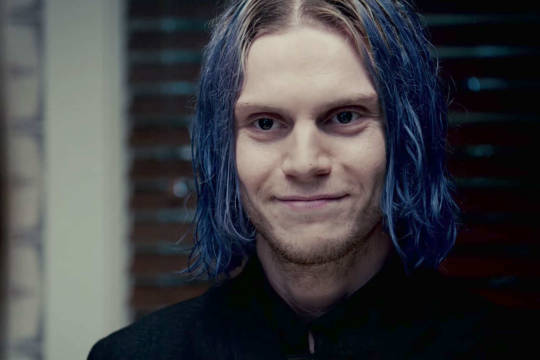
Now, they wanted a political villain, right? AHS Cult gave as a political villain who is absolutely detestable every step of the way. But the reason he was scary and interesting is because...it was relevant af. Every word he said, every political opinion he expressed, the way he staged attacks on him by migrant workers and spread fear in his community - that rings very close to home right now. I can get why someone would say you can’t do the same in a Marvel film, but Sci-Fi has always been a projection screen for political subjects for decades now. Star Trek has been doing it since the 1960s and if they had actually committed to making Thanos allude to actual political slogans of today, he would have been way more relevant.
Dynamics (aka how to make someone likeable without condoning their actions)
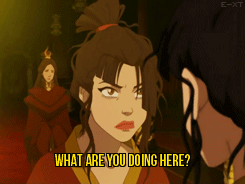
On my main, I made a post once about Loki and Magneto and how having, forming and developing relationships helps to flesh out a character. In short: We learn to understand them. We see them grow. We see (ideally) how they learn from encounters and how it shapes them. Now we are entering the realm of likeable again with Azula, because what made her a brilliant villain was not her brilliance or her abilities (they made her a great opponent though) but her motivations. The more we see her family, the more we learn that she, too, is a victim of a dysfunctional family. She allows a whole new perspective on the royal family. That scene where she tells Ozai that he ‘can’t treat her like Zuko’? - those were ten fucking books written in one line. Her descent into paranoia basically rewrote every scene of her in the past and is also a reminder that she’s 15 and yes, of course, she’s a victim. She’s a child fighting in a war.
How many meaningful relationships does Thanos have? He’s quite fond of Gamora I guess? Less fond of Nebula? There was an embarrassing attempt to create a connection between him Tony. Now, remember that in the comics, Thanos is someone driven by love. He loves death - that’s the relationship that drives him. It’s important that there is a face to everything. Show me Thanos family, show me his homeworld. Show me his previous desperate attempts to save the people he loved and how he was held back and driven to more and more desperate measures. Show me how he finally gives in and wants to destroy everything.
“show don’t tell”

I’m going to argue for a Thanos solo movie now :) (kinda)
Okay I feel kinda compelled to put David in this when I’m already posting this on my rp blog but also a) I love him and b) shut up. short summary: David was created an android that is programmed to serve humans. He grows to resent them more and more, especially because many of them are petty and abusive towards him until in the second film, he just wants them dead. Now in his first scenes of Prometheus, we see him alone on the ship while the human crew is in cryosleep. We see him eat, play basketball, ride a bicycle, watch people’s dreams. He also watches Lawrence of Arabia while dying his hair to look like him and quotes the above sentence several times just before the rest of the crew wakes up.
It’s a tiny sequence in the film but we learn various things about David: He’s vain, he does things he - as a robot - doesn’t have to do, he identifies strongly with a man torn between two cultures, he has a lot of fun when he’s alone, he habitually spies on people, he is feeling pain in some capacity and he associates it with humans. We learn all of that in those few tiny moments.
compare all of what we learnt in this short sequence to what we know about Thanos. After seeing him in...I think three films by now? And having people talk about him in even more? With literally every character I listed now (excluding Moriarty bc he’s a negative example) we know what drove them to do what they did. We know their pain. We know them. Even if the things they are cruel because here it comes:
They are a Story.
And Thanos is a plot device.
or to quote fellow tumblr user hackedmotionsensors: I’ve never liked Thanos because hes like a video game villain. Like he’s the annoying equivalent of finding the final boss in a FF game and its just a giant head or something stupid.
6 notes
·
View notes
Text
Favorite Character Tropes as Wish Fulfillment?
I wrote that title after I analyzed this stuff because I realized a thing about myself I was unaware of. I always get attached to the Same Character. Like, they are literally the same person in different stories. And I want to know why. So I did a little digging and thinking and all that good, good stuff.
Here are a few examples of my typical favorite character
Charlie from Lost
Virgil from Sanders Sides
Philip from Travelers
the Doctor from Doctor Who (specifically 10)
Klaus from Umbrella Academy
Stiles from Teen Wolf
Riley from Sense 8
Cisco from Flash
Peter Pan from any version of this story
Jim from the Office
Peter from Heroes
Merlin from Merlin
Will from Hannibal
Felix from Orphan Black
Chuck from Chuck
Josh (the werewolf ) from Being Human
Jessica from Jessica Jones
Castiel from Supernatural
Loki from Marvel
Skylar from Heroes
Sherlock from Sherlock
Zuko from The Last Airbender
Killian from Once Upon a Time
I could probably find more but you get the idea
General similarities seem to be:
out of 23
21 are male?
15 have some type of addiction/problem they have difficulty controlling? (drugs, attention, adventure, eating people, killing people, ya know, etc)
17 have a secret
‘neuro-divergent’ in some way? (ADD, PTSD anxiety, depression, something? the kids are not alright)
All 23 have grey morals (probably chaotic good-ish? they all would break the rules for a good reason or get what they want)
19 have a crappy homelife/large tragedy in the past
20 have ‘superpowers/special ability’
18 are physically weak in appearance
18 are Underdogs, underestimated but actually powerful/very intelligent?
7 have a redemption arch
17 have dark hair lol
18 have a sarcastic, sense of humor
14 talk too much
mostly white in one form or another :/
So... why?? Why do I tend to like these characters more than others?
male. I am female and there are a few female characters that I LOVE. They happen, but, in all honesty, they are far and few in between. Wonder Woman, Jessica Jones, Hermione, Rey, Riley, Rory (Gilmore girls) Perhaps it is the way girls are often written? I like Jessica Jones because she is a hilarious mess and I relate. Same with... all of the ones I like, actually. They have that grey-moral vibe of real people, but lack the sexy Cat Woman, I’m-so-bad-I-can-kill-you-with-my-massive-butt-and-boobs?? Thing?? yeah? how unfortunate. They are small breasted or, at least, that is not drawn attention to too much. Could it be. holy moly, ya’ll. could it be I like women characters when they’re written... like people? like. like, as if girls are screwed up humans! not objects?? isn’t that incredible.
srry but not srry
an addiction. now, why do I tend to go here? Its a kind of a painful trope. They always go back, and back and back again to what we know is horrible for them. Perhaps there is enjoyment in watching the struggle and seeing them inevitably win their struggle, whatever it is? The strength to conquer the darkness within themselves and do the right thing. It might just make you think you can conquer your own battles?? Maybe I feel like I can relate in some sort of way, going back to old habits, struggling to be the person I want to be. Year after year of the same new year goals...
a secret. This is honestly just a nice trope and its neat, fun writing. Creates tension, and it is usually connected to the addiction. You get invested in this secret!!! It builds up to the inevitable discovery of that secret and the aftermath and all the reactions of their friends. (merlin, Will graham, chuck, etc.)
Neurodivergent. I think this is just me relating to these people. I have bouts of depression and anxiety and am currently researching the possibility of having ADD (thats a whole new weird thing idek) so this is just something that I think I see in myself.
Grey-morals. Again. This is my moral alignment, shocker. So, again, me relating to the characters. Also, characters that obviously have flaws are just well-written, well-rounded characters? No one is actually Clark Kent. characters that seem perfect either come off as plastic and fake because real people do not act like that, or they come off as kind of creepy?? because they must have some darkness lurking beneath the surface (when this is done on purpose, i actually like this quite a lot. Rose Quartz is an example of a character who seemed perfect on the surface, but as the show moved on, is revealed to be a Real Disaster Queen. she isn’t evil, just kind of a brat, but that redeemed what seemed to be sloppy storytelling because it was realistic)
Tragic past. This is just something that authors give to Disaster People to justify their screwed-up-ness. Course, not all of them had tragic pasts, but something bad happened to all of them (except Jim from the Office I think??, but then again, that is a sitcom...)
Special Ability Again, wish fulfillment. Not even gonna lie. I often feel powerless and out of control, this Freaks Me Out. I think there is comfort in seeing the ‘little guy’ (aka le me) having with a BAMF hashtag
Weak And once more on Relatable-Station. This is in connection with relating to feeling and looking powerless, but finding comfort in the secret strength these characters have whether through supernatural means, superior intelligence, biting humor, a quick tongue, etc.
Underestimated the cap on this trio. The last 3 points could be summed up as one thing. A weak, underestimated person actually has some secret strength. These characters might just be a coping mechanism I have to deal with feeling weak and overlooked and powerless, whether or not those feelings accurately portray reality. I wonder where those feelings came from in the first place.
A redemption arch This trope is often a result of having grey morals. These also help deal with feelings of inadequacy or guilt in the reader?? It makes you think, if they can be loved, surely I can. (i am really dragging myself in this post, which was not the plan lol but here we are)
Dark hair/brown hair. I have dark hair, I also wanted black hair as a child and found it very beautiful. Also, I think the dark hair goes with the personality trope as a Screw Up. Not gonna lie, messy brown/black hair on boys and girls, honestly, but the short messy thing, is great. and when they go evil for a bit and the hair gets Extra Messy?? That. That’s. Good. (for reference see: Stiles, Killian, Peter, Virgil, Loki)
Sarcastic my flavor of humor. this is turning into the realization that we do, in fact, like characters we relate to the most. I thought that might be far fetched because I’m ‘nothing like’ these characters, but let's get real. They’re me but as a cute boy or girl.
Talk too much This isn’t me. but This is who I want to be, I think. I’ve always struggled with anxiety about being the quiet one while my brother was so much better at talking, making friends, etc. so this is, again, wish fulfillment. i swear i didn’t think this was going to be this self-indulgent but i obviously was wrong
White They aren’t all white. Zuko is Asian. Cisco’s actor is Columbian American. But that’s... thats a really small amount of diversity. Like, I’m concerned. (when i say white btw, I don’t mean just American or British or whatever, because there are characters on here that are from all over. I just mean overall white-looking for the sake of this analysis)
So, First Hypothesis: prejudice is very ingrained and even with good intentions, i could be subconsciously avoiding characters that are POC??? If this is all a ‘projecting myself’ thing, then I relate to white people the most? Im sure im screwing this up, but i’m not gonna chicken out and avoid this because thats what I’d usually do to keep from dumbly saying something offensive, but if I dont address a problem, then no one is getting anywhere
Second Hypothesis: Its been known the fiction industry as a whole has a problem with representation,,, I don’t want to discount me being white, but I don’t think this is just me and my tiny entitled butt. There probably isn’t as much access to that type of character for POC. How often do creators have well-rounded, stick-around-for-a-long-time, flawed, funny, sometimes-problematic-but-well-meaning characters that are also POC? not often enough. Maybe it’s not always on purpose. But because of ‘Diversity Points’, character development might get pushed aside, and then the character’s personality becomes Their Race, which is... a crappy way to build a character? The industry has a hard enough time with diversity in general. Maybe people just don't write POC as that type of character. Which makes characters like Cisco unique. I’ve never even thought about that... Good on you, Flash writer crew.
let's fix this??
need more Ciscos???
if any POC feels inclined to call me out on my bull or give their insight (only if you want to, of course), pls do.
In conclusion: this was interesting, and it makes sense, I guess, why people like different types of characters if their favorite characters are projections in one way or another of them. I’m not saying that we all relate to our favorite characters, but me, because I have this weird, dozen or more of the same type of character that I love, it might be reasonable to assume there’s something about that character I see in myself or wish I saw in myself? Anyway, an interesting thought. What do you guys think? Do you see yourself in your favorite characters?
This has been an honest essay that got too long. I wish I was as invested in writing school essays as I am in Tumblr posts.
#i didn't think this would be this long#writing#character#analysis#writer#teen wolf#doctor who#sanders sides#sherlock#supernatural#being human#avengers#marvel#moral grey#moral alignment#intraspection#flash#chuck#heroes#jessica jones#travelers#sense 8#merlin#hannibal#last airbender#zuko#once upon a time#killian jones#discourse#thoughts
56 notes
·
View notes
Note
For End of the Year Writing Meme: All the questions sound super interesting so just use this as an opportunity to answer whatever questions interest you most
So funny story I put this in my drafts to complete in the quiet time of New Year’s Day, but then I forgot about it completely. BRACE YOURSELF.
A. If you could rec a piece of music to accompany one of your fics, what would you pick? Why?
Lies by Marina and the Diamonds, to accompany the latter half of Valse Melancolique. It’s a really good song to show Irene’s POV at that point, especially her reluctance to accept that the webs she’s spun are basically collapsing around her.
“I just want it to be perfect / To believe it’s all been worth the fight,” is the most relevant set of lyrics, IMO.
B. Who’s your favourite side-character from something you wrote?
I really enjoyed writing side characters like Rose and Finn, though Rose just edges it because I’ve been enjoying writing her in Don’t Complicate It. Finn runs a very close second.
C. Get any good comments on your stuff this year?
Sure! All comments are good comments, let’s be real. Unless they’re an obvious troll comment or those “update now!!!” kind of comments. Those aren’t so good.
D. Any drawings or pictures that had a big influence on your writing?
The artwork of the late 18th century and Roberto Ferri definitely influenced the tone of Valse Melancolique. Many scenes from certain stories were driven by a single image I had in my head as well.
E. Who’s your favourite main character you’ve written?
Though I do enjoy delving into Ben/Kylo’s psyche, I enjoy writing Rey more – she’s more enclosed, and I love chipping away at characters to get to their truths.
G. Where do you think you grew the most this year?
Towards the end of the year, I began to realise that writing can actually be fun like it used to be. I’ve been so aware of the way the world is currently that I’ve been convincing myself that my writing must have a message, or it’s not ‘worthy’. I need to understand that I started writing not to pass on any morals or messages, but as a release and a way to find enjoyment in the constant buzz.
H. How do you write? Paper, pen, computer? Music, no music?
All of those. I write on my phone, on my computer, on pen and paper. Music and no music, it depends. Most often I’m listening to a playlist/album which then stops and I cease writing an hour or so later realising I’ve been writing in silence.
I. What’s your favourite work you did this year? Why?
I’m always tempted to answer this kind of question with my most recent story. But I’m going to be really honest and say that star among the stars is a personal favourite. And it’s not just because of the pegging.
J. What are the best jokes you told this year? Any jokes you thought were funny that people didn’t catch? Vice-versa?
I’m completely blanking on this one.
K. Who have you killed this year? Why did they have to die?
Qui-Gon Jinn (to match with canon), Molly and Sherlock (hey it was a story based on Dangerous Liaisons, and I was reading classical Russian literature at the time of plotting) and Kylo Ren a bunch of times (metaphorically).
L. Which character did you most write about this year, and why do you like ‘em?
I wrote more about Rey. As mentioned before, it’s because I like chipping away at a character’s surface but also it’s because I really relate to her, especially in regards to her feelings of loneliness and her tendency to put on ‘a brave face’. Plus I really admire her compassion and her strength. I envy it.
M. Meta! Have any meta about a story you’re dying to throw out there?
Not particularly -- just headcanons and reasons behind why I write what I write. (I’ve never been very good with meta anyway.) I really like it when other people meta my fic, or pick up on something I didn’t! That is an AMAZING feeling.
O. Do you believe in outlines? Show us one!
I do indeed! I love my outlines. For some projects, I’ve got whole folders with docs labelled Initial Ideas, Plot Summary, Chapter Outline, etc. etc. I’ve got my notes app on my phone stuffed up to the gills with mini-outlines. I frequently use my story structure template, which is technically more for screenplays, but the breaking down into acts thing helps my brain figure things out.
P. What are your pet peeves in other people’s work?
When an author relies too much on UST and ruins the pacing. Like, an author drags out the first getting together because they believe that the anticipation is the only thing generating comments. If it’s right to have them bang, have them bang! The awkward morning after is a delicious opportunity for UST -- just a different kind. 9 times out of 10, your readers are there not for the smut because they’re invested in the story and like your writing.
Q. Quote three bits of writing you read this year. Can be your writing, or not.
Let’s mix it up.
“ “Why did you do that?” he demanded as they ducked into a side alley. “What part of ‘keep a low profile’ is difficult for you to understand?”
“I’m a good haggler,” Rey said through a full mouth. She didn’t have any idea what she was eating, and she didn’t care. It took so much effort to chew each bite instead of gulping it down whole. “He was trying to cheat us.”
“You didn’t haggle. You pushed.”
“I did not. Why would I knock him over in the middle of his stand?”
Kylo just stared. “You need a teacher,” he muttered. He watched her eat for a moment, his expression somewhere between thoughtful and disgusted, before taking a bite from one of his own skewers. Disgust won out. ” -- Symmetry and Black Tar by audreyii_fic. (Grumpy smuggler Kylo Ren, spunky scavenger Rey, canon divergence. Excellent.)
“ "Ben," Rey breathes once Kylo's mere inches away. It's the name Luke introduced him with, the only name she knows him by, and he's never bothered to correct her. Why hasn't he corrected her? The question flees from his mind as she closes her eyes and he leans down into the space between them, kissing her full on the lips. It's not gentle, he doesn't know how to be, but she opens for him the way the flowers she loves so much bloom in the sunlight. ” -- the surface of last scattering by diasterisms. (It’s the apocalypse, it’s exactly the right time to meet the love of your life, right? Read for utter devastation.)
“ Rey could spend hours in the Falcon’s inner workings. She’d spent so much time in the belly of hollowed-out Star Destroyers, which were horrific remnants of old worlds, cold and grey. The Falcon is alive, speaking a strange language she’s just about half-deciphered. Sometimes, on days where she misses the connection most and dreams of a boy reaching across the stars to find her, it feels like the Falcon doesn’t want to speak to her. It shuts down. Sparks spit at her, and mechanisms develop odd faults.Today, a jet of steam blows directly in her face, not harmful, but almost like a snarl of 'go away'.
Rey climbs out of the hatch, fetching tools. She works with that fault first.
“I’m not thinking about him,” she promises to no-one but the ship she’s looking after. ” -- If I was born as a blackthorn tree, by me!
R. If you had to rewrite one of your stories from scratch, which one would it be? What would you do to it?
Going to cheat here and head back to 2017. I’d rewrite Two Stars Aligned. What I’d probably do is make it a post-TLJ fic, where Rey and Ben decide to run away after getting involved in a secret relationship, but get shot down by the First Order -- after landing in Giaca, they become embroiled in Game of Thrones style politics and the ruling families, while the Resistance and the First Order conduct searches for them. I’d cut out the weird Force shit and make the redemption arc thing more organic by giving the whole story room to bloody breathe. Two Stars Aligned is actually the reason why I now try to stick to oneshots for exchanges and any anthologies I get involved in.
S. What’s the sexiest thing you wrote this year?
Sexiest thing written in 2018... It’ll have to be the pegging in star among the stars.
T. Themes, motherfucker, do you have them? What are they?
Feminism. Females being allowed to be as fucked-up and broody as the men they love, and perhaps, even broodier. Make women afraid of commitment, 2k19.
U. Any stories that took an abrupt U-turn from where you thought they were going?
If I were a blackthorn tree took a pleasing turn away from the initial outline. The initial idea was lots of secret trysts and stuff like that, but I much prefer the quiet romance with a note of hope at the end that it turned out to be.
V. Which story was the most viscerally pleasing to write? Tell us your narrative kinks.
Huh. Hm. Don’t Complicate It is turning out to be kind of fun to write; when I’m not allowing myself to be crippled by the brain goblins that is (they’re strong lately). It’s a combo of writing a trope/kink I’ve been wanting to write for ages -- A/B/O -- and remembering that it’s okay to have fun with it.
W. Who are your favourite writers?
@kylo-wouldnt-like-those-chips - @conchepcion (every time I think I’m out, she pulls me back in *shakes fist*) - @introspectivenavelgazer - @audreyii-fic - @kylorenvevo - ambiguously - @fettuccine-alfreylo and SO MANY MORE (this post is long enough already!!)
X. What’s your least favourite work of this year?
My least favourite has to be In Cars. It was an ambitious idea, which I didn’t really fulfil, I feel. Curse of being a perfectionist. I want something to be amazing. World-changing! Tear-jerking! I want Vestal virgins to weep golden tears over my words, already delicately transcribed onto ancient parchment by monks. Obviously, that’s an impossible standard, but I can’t help being cross when I don’t reach it.
Y. Why did you write? For fun, for a friend, for acclaim?
During 2018? Mostly for acclaim. It made 2018 a very difficult year for writing, and just a difficult year in general. I’m trying to make sure I have fun during 2019 with this stuff. Striving for perfection is a punishing task that no-one can ever accomplish because perfection doesn’t exist. Contentment does, though. As does happiness. And those should be more important.
Z. If you could choose one work and immediately finish it, what would it be? How would you end it?
I’d finish Sanctum, my priest Kylo fic. I’m split between continuing or rewriting anyway (the rewrite would include relocating the action to the medieval era, around the time Luther wrote that damned essay and pinned it to the church door). But I do know the exact image I want to finish on, which will remain whether I end up rewriting or not. It involves a name, a scrap of material and a rather fetching colour scheme.
Ooh. Cryptic.
#anonymous#answered#end of the year#did i just answer all these q's?#yes#i did#my ego is MASSIVE and i'm so sorry for that#long post for ts
5 notes
·
View notes
Link
Speaking at a panel at the London Film and Comic-Con today, the 41-year-old said that there could only be one character his detective could be coupled with in the BBC hit series.“Now, there’s only one choice, isn’t there? Come on,” he told the audience of fans, before jokingly adding: “Doctor Watson.” He continued on a more serious note, explaining: “I think it would have to be Molly, wouldn’t it? Love for him, after all, would be thinking more - maybe that’s asking too much - maybe thinking as much of someone else as he thinks of himself.”
Headcanon Times:
I know everyone, including the actors, have their opinions about the characters but this is one where I fully, fully agree with Ben. I want to be clear, I don’t watch Sherlock for romance - though romance, in the broader sense, is integral within the series as a whole. It is heightened and artistic and deep and exciting and adventurous and funny and witty and terrifying and, yes, heartbreakingly romantic, too.
<!-- @page { margin: 0.79in } P { margin-bottom: 0.08in } -->
I had always viewed Irene as Sherlock’s first real exposure to love. I think there was an immediate attraction and, possibly (without knowing a thing of his history and only going on what the series implied) his first physical experience as well. I’m very much in the camp that believes he and Irene had a physical encounter after he rescued her from being executed. I think he pined after her for many years but I also find it telling that he rarely engaged her no matter how often she texted him. I think he didn’t know what to do with his emotions regarding her and, as has been his method regarding strong emotions, he set them to the side rather than face them head on. “You didn't win, you lost. Look what you did to her. Look what you did to yourself, all those complicated little emotions, I lost count. Emotional context, it destroys you, every time.”
If the man Sherlock has become is his memory of Eurus then it’s no wonder than his view on emotions would be skewed towards seeing them as a crutch rather than a strength. His connections with people were severely damaged between his two siblings - Eurus for her own inability to healthily relate to others plus, you know, murdering his best friend - and Mycroft, for keeping that truth hidden and for teaching Sherlock that human connection is something to despise. At least Mycroft has begun to see how badly he’d wronged his brother, in that regard.
When he met Irene, he’d already begun opening himself up to humanity again. John was a healer beyond his abilities as a doctor. He was crucial to pulling Sherlock back from the edge -possibly - just in time. It’s terrifying to imagine what would have happened to Sherlock had John not entered his life when he did. Because of John’s influence and heart, Sherlock’s emotional walls developed a significant crack. So, that, by the time he’d met Irene, he was already in a place where he could be blindsided by the power of these newly reborn feelings. I think there’s even room to speculate that Sherlock’s emotions towards Irene were so incredibly powerful BECAUSE he hadn’t had much practice with them, yet. To use the familiar cliche it was like gaining sight where once he’d been blind. He was overwhelmed and, as much as Sherlock could be, nearly sick with his infatuation. (bear in mind, still, this is speculation. Sherlock has always maintained an outer cool for a good portion of the series and there are very few times he’s shown his chaotic feelings - but we’ll get to that...).
We know Molly, by this point, has had an ongoing crush on him and it is implied, based on his response to her, that Christmas, that he possibly wasn’t truly aware of that. Or, at least, not the depth of it - given his shock at reading her card. It makes me wonder, then, what, if any, real experience he’s had with attention from someone who views him in a sexual way. Obviously, with John’s blog making him a celebrity, that would have begun to change quite quickly - not that Sherlock has ever had the desire for such distractions (that he’d have felt desire, in and of itself, is another matter entirely. Ben has stated that he did not view Sherlock as cut off from things such as arousal - but that he’d have repressed them in order to put all of his energies into the Work). When he’d believed Irene to be dead, he came very close to using again - or, possibly, something even worse. There isn’t time to explore what he may actually have done because she revealed herself soon afterwards. It is clear, though, that his care for her developed very fast. He’d met her just one time - was outsmarted by her - drugged by her - and then began receiving repeated suggestive texts from her. And, shortly thereafter, he composed an incredibly moving and emotional sonnet for her. Even Ben isn’t certain whether what Sherlock felt was more love or more lust. I don’t know that it is always one or the other as so often those things are intertwined - though possibly weighted more heavily on the physical. In any event, without delving too far into Irene’s relationship, it feels as though they have little to build on, between them, beyond the physical. They play cat and mouse. They have a game of outwitting one another. But beyond wordplay and the occasional whip... Irene would never be a true partner. She has a life she loves and a career that, by its nature, does not mesh with the sort of partnership needed between a man and wife (not that I think she’d ever want something as domestic as that). On top of all of that, she already has a steady female partner that she obviously loves and Sherlock is an aberration for her. He’s a temporary delight but I cannot see any scenario where she’d want to be at his side, through ups and downs, falling off the wagon, getting lost in his work, family dramas... Well, point in fact, she never was.
So, now to the part of this musing that I’ve been building towards.
I gave myself a series of questions and I’ve spent a few weeks, actually, thinking about them. Faithful characterization is really important to me. I want to see the honesty of how a character is represented without overlaying intent just because I WANT to see it. (to be clear, this is not a comment on fanfiction or various pairings or anything of the sort. This is me trying to parse the authentic character, based on what I've interpreted on screen, for my own creative process).
Sherlock's relationship with John is a powerful friendship that has laid the groundwork towards developing his emotional balance. While he will always be a bit of an arse – suspicious of overt emotional displays – in short, he'll be himself – he has also warmed up in ways that would not have come about otherwise.
Molly is the first person that Sherlock, at least on screen, apologizes to. The reason being for his callous cruelty when he chose to deduce the reason for a gift she'd brought – correct motivations but incorrect recipient in that he hadn't connected the dots in that the gift was for him. Instantly abashed for causing her humiliation, he apologized, begged her forgiveness, and kissed her cheek.
Of course, Sherlock now starts to exploit her infatuation because, still, he doesn't really get what love is all about. He doesn't seem to see what it is to emotionally hurt someone because he's cut off proper access to his own heart. In fact, to leap ahead, it is amazing character growth to contrast his early interactions with her – faking interest in her hair and make up just to have access to bodies – against his honest pleading with her to say “I love you” and then having an absolute melt-down when he realized Eurus had used him to emotionally bludgeon Molly.
“You look sad, when you think, he can't see you.” Molly is one of the few people that Sherlock cannot bluff his way around. But this moment also reveals that she is one of the few people he trusts enough to show his real feelings. Yes, he will show John those feelings as well, but in this circumstance he simply couldn't afford to. But he had to be able to relieve some of that emotional stress with someone and Molly was the one he turned to – even if he wasn't initially aware that he was doing so.
Sherlock Holmes: [waiting for Molly in the darkened lab, she enters and is startled when he begins to speak] You're wrong, you know. You do count. You've always counted and I've always trusted you. But you were right. I'm not okay.
Molly Hooper: Tell me what's wrong.
Sherlock Holmes: Molly... I think I'm going to die.
Molly Hooper: What do you need?
Sherlock Holmes: If I wasn't everything that you think I am, everything that I think I am... would you still want to help me?
Molly Hooper: What do you need?
Sherlock Holmes: You.
When Sherlock prepared to fake his death, one of the few people he implicitly trusted to help him was Molly. Not only did he trust her, he approached her in a very open and emotional way. He didn't simply ask her for help. I've thought a lot about the above lines and Sherlock's build up and what it all meant. What I end up with, basically, is him asking would she help him even if he wasn't the near legend that he has become... if he were the lie he's going to be forced to assume in order to make John think he's suicidal. And Molly doesn't hesitate. She will follow him into hell. And I think this might be a moment where Sherlock was still unaware of how MUCH she was devoted to him. Thus his hesitancy. And, yet, he trusts her completely.
Later, Sherlock spent time living with her while in hiding and sleeping in her room while she took the spare room. “We agreed he needed the space”. I don't, however, believe there was anything intimate going on between them and just given Molly's comments on it, it seems as though it was more awkward for her than anything.
Molly was the one Sherlock asked to go investigating when John was angry with him. He was very quick to understand that it was a one time thing because she was engaged. This was the second time he kissed her cheek; and followed it by saying she deserved every happiness. It's suggestible that he acknowledges her feelings for him by saying not every man she falls for can be a sociopath. Of course, one could read that he's referring to Moriarty but after such a tender moment that would seem a little crass. Though, this IS Sherlock and likely he would think that was a kindness. I find everything about this incredibly interesting. For one, though I've never thought there was anything romantic between John and Sherlock – there also were never any questions that John would investigate with Sherlock regardless as to whom he was seeing/married to. It simply wasn't a factor. For Molly, however, her being with someone else means she can't possibly do this with Sherlock. Why? Because of her feelings for him and, more, him recognizing and respecting that he cannot compromise that. While it doesn't say anything about his feelings for her, beyond friendship, it DOES show that he cares about her and won't ask her to do anything that makes her uncomfortable (another step forwards from series 1 Sherlock). It does, also, reveal something else. That if Molly hadn't been engaged, Sherlock would have welcomed her as a partner and that he'd enjoyed his day with her. Even if they weren't able to go out for chips after – his invitation.
The two people asked to be godparents of Rosie were Sherlock and Molly. If John also died, Sherlock and Molly would instantly be co-parents. I just wanted to throw that out there.
Molly is one of the people entrusted to look after Sherlock when he falls off the wagon. It's a short list.
When Sherlock is dying, it's a mental version of Molly who appears and saves his life. Now, for me, that IS telling in that John is the doctor and yet Molly is the one Sherlock's frantic brain latches onto first.
Finally, as was mentioned earlier, we have the infamous “I love you”. We've seen Sherlock fake emotion – fake tears – fake fear and very skillfully, too. He's gotten one over on John many times. With Molly, though, I feel as though he's learned a hard lesson about hurting her. He's trying to do better by her so he gives her his genuine feelings. And, certainly, in this moment he can't afford otherwise. He believes she'll die and Molly will not say the words unless he does first. “Say it like you mean it” may well have been stated “say it so I could believe it.” And, in fact, the first time he says it, she doesn't appear to believe it. She can tell when he lies and, I think for a long time now, she can tell when he's faking kindness to manipulate her. This is where my honest belief about this comes into play. That in order to get her to say the words to him, he had to speak truthfully. An I think that was why it was so tremendously devastating. It opened a wound he hadn't realized existed until that moment – something far deeper and FAR more demanding than that long ago emotion he'd felt for Irene. Irene would never be compromised by a declaration of love. It's possible she may even find it tragic because part of me thinks Irene, too, finds emotional investment to be compromising. I actually think there's a lot of evidence to support that. With Molly, though; who has carried this steady love for so many years – have carried Sherlock through his tragedies, has been emotional support and safety... he cannot wedge open his heart like this for the moment it takes to “save her”, only to close it once more. This is something that has ramifications for the both of them and there is every chance this forced enlightenment comes at the cost of something he wasn't given the time to figure out and act upon. In finally figuring out he loves her he may have lost her in that same breath.
If ever there is a season 5 I wonder that this would even be explored. It's hard to say. But if this is, really, the end of the show it is just as easy to see where it COULD lead.
3 notes
·
View notes